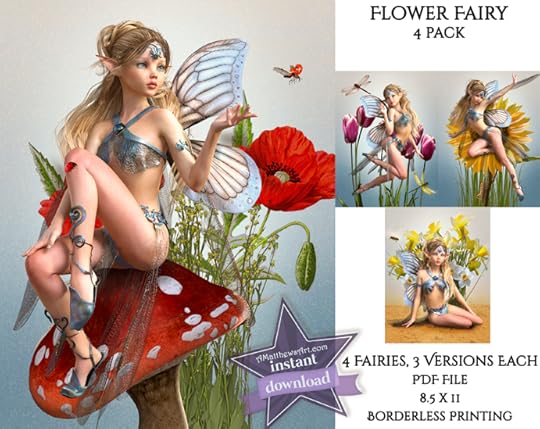Mande Matthews's Blog
April 2, 2025
Hunger Therapy – #Short Story: When your natural instincts clash with your moral compass
#ModernFantasy #UnlikelyAlliances #FantasyWithHeart #humorousstories #darkhumor
“I know it’s wrong, but I can’t help myself.” The words scorched my throat as I hunched outside my designated therapist’s window. The union had assigned Dr. Hardley to me, and the window kept us separate. Our kind weren’t allowed direct access, and flame-resistant glass provided extra protection for good ‘old Doc—so the powers that be thought. Let ‘em think that, right?
The sun glared on the pane, ripples of light dancing about, morphing the Doc into a special effect show, her twilight skin and silver-streaked hair blotted with rainbow color splotches. She inspected me from behind thin wire-rimmed spectacles, which, despite their innocuous appearance, contained a video monitoring system that fed a live shot of me to security—just in case. I didn’t think it offered much more protection than the double-paned glass, fire-retardant window-wall between us, but sure, why not?
I had to crouch to get a good look at Dr. Hardley, and I wasn’t sure if that was fear or accusation or something else behind those purple ombre rims. Hell, maybe it was boredom. Therapists were notoriously hard to read. She momentarily tugged a curly strand of hair across her tight lips as she scanned my paperwork, apparently lost in thought for uncomfortable moments while my confession evaporated in the space between us.
Was she even listening? What, exactly, was the Federation paying her for?
Then her voice finally crackled through the speaker, “Why do you think you can’t control yourself, Jim?”
And that was the billion-crypto question. About time she got to the point. Why? Why did I persist in consuming something so awfully bad for me? Something fatty. Something gorged with cholesterol. Something that might just push me into full-on heart disease if I didn’t get a grip, and that wasn’t even the worst of it. The eating. It was morally reprehensible. Despicable even. I couldn’t even look at myself in the mirror anymore. I shook my head and snorted, ashamed. Ashamed for what I’d done. For the lack of self-control, hell, self-respect. I slumped in my spot, wanting to disappear into the concrete.
“It’s okay, Jim,” said Hardley rather monotonously as if she’d practiced that measured, unemotional drawl a million times over. That irritated me. “We all do things we don’t understand sometimes. Let’s look at the latest incident and see if we can get to the bottom of your why. If we figure out the why, we’ll have a better chance of controlling the behavior.”
The scent of over-boiled hot dogs drifted through the courtyard as I considered her question. Just beyond the tree line and spiked iron pulsar fence guarding our little “office,” street vendors wrapped up for the afternoon, and the smell of meat byproducts made my stomach gurgle despite their questionable freshness.
 Unsplash.com Karolina Grabowska
Unsplash.com Karolina GrabowskaTalking about this wasn’t easy. Talking about personal matters, in general, wasn’t easy. I was taught to be tough. Strong. Someone who could handle my own shit. My throat tightened like a red-hot poker got stuck in my larynx. I blew breath through my teeth. “I’d had a hard day,” I remembered, “and went to the park on 7th and Central, you know, the entrance with the Mortimus and Jaw Bones statue?”
Hardley’s face softened for the first time since we’d met. “Yes,” she said, nostalgia warming her tone, “I know it well—a landmark moment in our history. I remember the day Mortimus and Jaw joined forces, and the relationship between us changed forever. But there’s still so much work to be done.” The weariness in her was palpable, from the droop of her eyelids to the drag of her voice.
Clearly, Hardley was a woman who had been worn down over time. Perhaps we all were, but at that moment, I realized her monotony wasn’t disinterest or a mask for fear but life-long tiredness from trying to negotiate our societies’ strained relations. Her rehabilitation skills put her squarely in the center of this mess, piling her with unfathomable expectations to smooth over a millennium of hard-wired beliefs and behaviors. She slid her runaway glasses back up her nose. “But go on, you went to the park, and…”
“I guess I was a little stressed out.” The sunlight bounced off the windows and danced over me, lighting me up, beautifying in a way I wasn’t worthy of. “Mirna just told me we hadn’t conceived. Again.” My voice cracked at that last bit. I wasn’t sure how I was going to hold it together.
Hardley’s dark eyes flooded with sympathy, wide and consoling, breaking through any monotony I’d detected earlier. “I see,” she said, “And I am so sorry for your loss. That’s an unacknowledged grief for many, especially for hopeful fathers, if—”
“Yeah, yeah, it is what it is,” I said, “I don’t cry over broken eggs,” and just then, my voice faltered, despite my attempt at nonchalance, giving me away. I quickly continued so as not to give Hardley an in, “Anyway, I was just sitting there perched on the overpass—that stone bridge about a hundred paces in from the entrance when I spotted them. A dad, two kids—boy and girl—and a mom. They seemed so happy. Mom—”
 Unsplash.com
Unsplash.com“Mrs. Nia Hasgrove,” Hardley interjected. “It’s good to humanize them.”
“Nia,” I continued, and that boil in my throat doubled like a fire-start lighting up my belly. “She was laying out a red checked blanket, unloading a picnic basket filled with sandwiches—peanut butter and strawberry jam from the smell of it. The guy…” I tried to clear the lump in my throat with a hot, gurgling cough, “I mean, Will Hasgrove, he was playing chase with the little ones.”
“Bailey and Jesse.”
“Yes, Bailey and Jesse,” I repeated, fire simmering behind my words. “They just all seemed so… Happy. Perfect. Like a rosy photograph or one of them old Rockwell illustrations. Pure dream stuff. Funny thing was, I wasn’t even hungry. I just remember the fire in my throat. I unfurled my wings, swooped down, snagged Will, and swallowed him in one gulp. He didn’t even have time to scream, but the kids and the wife, they were screaming and screaming and screaming bloody murder—which, I guess, it pretty much was—and before I even had time to process, I’d gobbled them all down, too. Slurp. Like a pile of gummy bears. Squealing gummy bears, but you get my drift. Humans are so easy to swallow. Not so easy to digest.”

The dragon, Jim, an impressive, glistening, onyx-scaled Terososips—one of the largest and most powerful breeds used in the UDSR dragon army for air combat for over four hundred years—hunched outside my therapy window-wall and sobbed. Sobbed for what he’d done, sobbed for his lack of control, sobbed for the guilt and shame of it, and sobbed, too, for his lost dream—the family he had hoped for but might never have.
I’d witnessed this pattern throughout my twenty years of cross-species therapy. Humans weren’t the only ones with impulse control issues, and dragons carried the additional burden of evolutionary drives at odds with our new social contract. “Let it go, Jim, let it all go. There’s no shame in crying it all out. It can be therapeutic, especially when you’re taught to be strong and tough.”
Jim buried his thorny black head in his scaly hands. “I just don’t know what’s wrong with me. Why can’t I stop eating humans? I don’t hate humans. I don’t want to be cruel, and for fire’s sake, the kids! I ate children! Children, Doc, children! The horror. I am despicable. Disgusting. A horrid, horrid dragon.” His sobs turned to wails. Rivers of saliva leaked from between his fangs, puddling on the concrete beneath him—we’d tried grassy knolls to comfort our patients before, but my clients kept igniting nearby foliage with fire puffs and burned out our entire recreation area. We’d installed the fire-retardant glass after an unfortunate incident with Dr. Goings. May he rest in peace.
“I shouldn’t even be allowed to live!” wailed Jim.
He was breaking my heart. From his spiked deck to the equally sharp spines over his back and tail, every inch of him trembled. Those mammoth, pearlescent black wings flittered against his sides. He was a dark mountain erupting with grief. Even the newly patched cement beneath him seemed to groan with his weight. “Come, now, Jim. Think of Mirna. She certainly wouldn’t want you gone.”
“She’d be better off without me!” Sparks lit up in his reddening nostrils. The few blanket flowers lining the window-wall, blazes of orange in the otherwise dull courtyard, visibly drooped as if Jim was a hot, unforgiving sun shining down upon them.
“I understand why you think that, Jim, really, I do, but I guarantee that’s not true. Mirna would be devastated if anything happened to you.”
“But it is! It is… so… true!” He snuffed and wailed and blew snot out his smoldering nostrils. They took on a burning coal glow. He shook so hard that the glass wall pulsed between us. The hot, simmering scent of fire breached the panes, and for a millisecond, my pulse quickened. It didn’t escape my notice that a grieving dragon was a dangerous one. For both of us.
I leaned forward, trained detachment giving way to genuine concern. “Listen, Jim. It’s not your fault. You are fighting against thousands of years of instinctual predisposition. It was only fifty years ago that humans were the dragons’ mainstay. That’s not long in evolutionary time. You’ve got to give yourself a break. This isn’t about willpower. Or weakness. It’s much more complex.”
“Yeah,” he blubbered.” But we didn’t know you humans had feelings back then, either. Now we do. Rudimentary, yes, but still feelings. It makes me feel so awful to know what I’ve done.”
“That’s right, Jim. You didn’t know back then, and change takes time. Not just for individuals, but for society to adapt. The Peace of Mortimus and Jaw is still new territory for all of us. We can’t erase centuries of animosity between us overnight. We’re going to have kinks to work out and that’s why you’re here, with me, working through this so we can all live together in peace one day. You conquer this, Jim, and you’ll be an example for the rest of your kind. A new standard of human/dragon relations.”
Jim didn’t seem affected by my speech and kept blubbering. “I mean, stop eating them for the sake of humans, sure. But I can’t even stop eating them for me. They’re so unhealthy. I mean, look at me,” he poked at the flab on his impressively scaled stomach. “I’m so fat and blubbery. I huff and puff when I go airborne these days and can barely fly for a few minutes before I need a breather! I wouldn’t blame Mirna one bit if she left me. Found a fit Wyvern or Draco to replace me. Hellfire, some days I can barely get my fat tail off the ground!” His sobs turned into what sounded more like a growl. Or a stoking fire.
“Be kind to yourself, Jim. I know it’s hard. But none of us are perfect. We all have issues of some sort. You can’t define yourself by one aspect. And like I said before, you’re fighting not only against your genetic impulses but a whole load of biochemical reactions you can’t control without help. And I’m here to help you, Jim. I’m right here.” I hesitated, then decided to share my own, albeit less murderous struggle. “Heck, do you know how many times I’ve tried quitting coffee?” Correction. Less murderous for others. Possibly a killer for me.
Jim shrugged but kept on sobbing, head buried in his clawed hands—a living oxymoron of strength versus weakness.
“The caffeine. Foof, Jim. It amps me up and makes me all jittery until I crash. I swear I will quit for good, but I wake up tired with a big day ahead of me, and there I go again, reaching for a latte. It’s so easy. There’s a coffee shop on nearly every corner. Same with humans. We’re easy access. We’re all over the place. We don’t even come with warning labels. Caution: consumption of humans may cause high cholesterol, heart disease, or premature death. It’s not easy when your environment is set up for failure. Our culture doesn’t exactly support our success. Same with the damn coffee. No one tells you a cup a day can raise your A1Cs. It’s loaded with sugar and calories, and Jim, sugar’s a killer. I’m officially prediabetic, and I know better, Jim. I do. But sometimes, I just feel like I need that one more cup. Hell, I had one this morning.”
Jim stopped trembling. The window wall between us stopped pulsing. He turned his massive saliva-stained snout, peeked over his claws, and peered out with his slatted yellow eye. It dilated to a big blackness as he pinned his gaze on me.
“You did?” He snuffled.
“Yes, I did.”
“How long have you tried to quit?” he asked, voice softening.
“Years,” I admitted.
He blinked and whistled through his nose, still the color of hot coal. “That’s a long time, Doc.”
“Quitting is not as easy as one thinks.”
“You got that right!”
I felt something shift between us—a connection forming despite our biological differences and historical enmity. In that moment, I made a decision that might seem reckless to my colleagues but felt absolutely necessary for Jim’s recovery. Perhaps for the recovery of both our nations, dare I be so bold.
“I tell you what we’re going to do, Jim. You see this?” I lifted my empty vanilla caramel mocha extra hot extra froth double-shot whipped latte cup at him. “This. This stops today. You and I are going to make a pact. Buddy up. Support one another.” I set the cup on my desk, pressed the remote, and the window-wall between us slid open.

The parting glass exposed Dr. Hardley’s fleshy human scent. Sometimes, humans are dumb. A lot of the time, really. I inhaled the sweet coffee-tinged aroma, and the burn in my nostrils intensified. “I don’t know if this is such a good idea, Doc,” I warned. Instinctually, I sat upright, in a predatory pose, a quiver rolling under my hide. Damn, she smelled delicious.
“I trust you, Jim. You won’t eat me because you know me. And deep down, you don’t want to.”
Hardley stepped across the partition, silver streak curls bouncing afternoon sunlight, but I registered her like a heat signature: Gooey, tender, fleshy warmth beneath her plasticine jacket, slacks, and loafers.
 Unsplash.com https://unsplash.com/@nataliablauth
Unsplash.com https://unsplash.com/@nataliablauthI gulped down the saliva filling my mouth as she approached. Her scent bore all the nuances of vanilla, caramel, and mocha mixed in with the undeniable tastiness of human. Even though Dr. Hardley was a lean woman by human standards, she still showed a little pot belly under that plasticine blouse, which I imagined would be tasty and tender. Geez. I couldn’t even stop thinking about it. My whole body quivered. What the hellfire was wrong with me?
Dr. Hardley seemed unaffected or oblivious to my desire. I couldn’t even detect the smell of sweat, though her heartbeat seemed to skip now and again. Either her years of therapy taught her how to keep her nerves in check, or she was one tough cookie. It wasn’t any human who’d walk up to a full-sized Terososips unarmed, despite our interspecies peace agreement.
She ambled over and settled down beside me, resting a wrinkled hand on my foot. I towered over her. One swipe and I’d batter her body—she’d be unconscious before my teeth ever sank into that coffee caramel vanilla flesh.
“Like I was saying, Jim. All sorts of things are happening in your body. It’s not just about willpower. I can prescribe something to help you through the worst of it until your body rids itself of the cravings. But your best chance, our best chance for success, is a support system. I am officially yours, and you’re mine.”
She patted my scaly foot, her touch like a fly landing on a brick wall.
“I don’t know, Doc—”
“Come on, Jim. Give it a try. What do you have to lose? Don’t you want to be the first interspecies accountability buddies? Imagine how that will look to all the young fledglings. You’ll be a hero. We could be our own version of Mortimer and Jaw. You and I could make a difference. For ourselves, and for the world. What do you say?”
I shrugged my shoulders. What could it hurt?
“Together, we’ll work through those triggers. Let’s give it a go. You said before that when you snapped, you’d been contemplating how happy the Hasgroves looked.”
“Yeah,” I admitted.
“And how Mirna and you haven’t been able to conceive.”
“Yeah,” I sighed, a trail of black smoke released. “I guess.”
“Do you see the connection?”
Did I?
“I reach for coffee every time I feel stressed and overwhelmed and unable to focus on my day. I desperately want to make a difference in people’s lives, Jim. So much so that I feel like I need that little extra fix to make that happen and consequently make me feel valuable, you know? So, it’s not just about having the willpower to stay away from the coffee shop, but my ability to feel valuable and worthy regardless of my performance. Make sense?”
“I guess.” I flexed my shoulders, my wings reflectively tightening. “I suppose I’m depressed about not being good enough to give Mirna the family she wants. Hellfire, that she deserves. And the Hasgroves were just so… perfect.”
“Does that make you angry?”
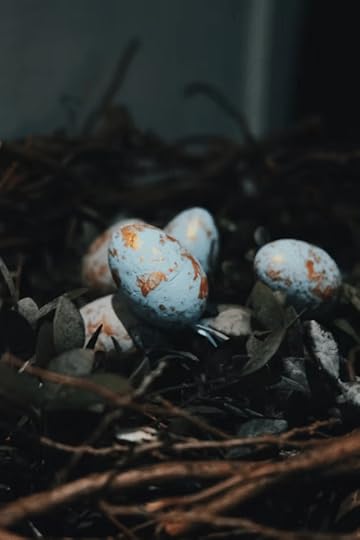 https://unsplash.com/@cherenkevich
https://unsplash.com/@cherenkevichI shrugged, rippling my scales. Sunlight lit us both; Doc’s sparrow-boned, wrinkle-worn hand resting on my leathered foot seemed entirely unlikely, yet something about that amber glow catching our skin seemed unifying. As if the light couldn’t tell the difference between scales and flesh.
“Yeah,” I admitted. The bird-like touch of her hand on me reminded me of my desire for a little clawed hand in mine, a hatchling of my own tucked beneath my wing, Mirna’s fanged grin and undilated eyes gazing at us both like a gentle flame. Satisfied. Fulfilled. Content. My wings constricted at the thought. Why did others have this? Why couldn’t I have this? “You got it right, Doc. I’m angry as hellfire! Seems so easy for everyone else. I see so many other pair bonds having lives and families and fun, and I try and try and try, but it’s never enough. I know I’d be a great sire. I just know it. I feel it in my bones. But it never happens. We’ve been at it for over a quarter of a century. Once, we had a clutch, but not one of them hatched. Not a single one.” Despair welled again, and I thought I might break. Fall apart. Ignite. Burn out the courtyard. Blaze until I simmered out and died. But Dr. Hardley’s hand rubbed the scaly hide of my foot. It was slight, that touch, her tiny human hand not more than a feather’s weight through my tough hide, but it was enough.
It was enough.
“That’s a lot of grief to carry around, Jim.”
The rumble inside of me slowed. “It does feel good to talk about it. I never thought talking could be so powerful. Humans have some sense after all. Thanks, Dr. Hardley.”
“That’s what I’m here for, accountability buddy.”
I sighed. Huge puffs of pent-up smoke circled out of my nostrils and into the air, lazily dissipating in the evening breeze.
I hadn’t noticed how late it had become. The sun melted a brilliant orangey purple over the far treetops, the same color as the flames that sometimes burned inside me, but gentler, more beautiful. Dr. Hardley and I settled into a comfortable silence for long moments.
 https://unsplash.com/@bornil
https://unsplash.com/@bornil“It’s lovely,” I said, watching the quarter bulb of light drift out of sight.
“That it is,” said Hardley, her voice lagged in our tranquil moment.
Just then, my stomach rumbled something fierce, and the good ole’ Doc tensed. Her pulse skipped. I smelled perspiration through her wafting coffee scent. With all this talk, I hadn’t realized I’d skipped suppertime. “Oops. Sorry, Doc. Didn’t mean to frighten you.”
“Don’t mention it,” she said, taking a calming breath, pulse slowly returning to normal, as we fell back into silence.
After the darkness settled in and the automatic courtyard lights flicked on, I admitted, “I still want to eat you.”
“I know. But you won’t.” She patted me like an old friend, and my stomach growled again.
“I bet you’re delicious.”
“Friends don’t eat friends,” she said with unwavering confidence.
“Never had a human friend,” I admitted. “You know, humans are a lot more compassionate than we give you credit for.”
“Dragons think humans aren’t compassionate?” She gazed up at me, startled, curious, sparrow brown eyes reflecting the courtyard lights through her spectacles.
“Hellfire. Look what you all do to chickens. Cut off their feet and beaks and throw them in a dark box. That’s some serious reptilian behavior you got going there. You do realize chickens share 98% of their DNA with dragons, don’t you?”
Those ombre-rimmed glasses had slid back down her nose, and she pushed them back thoughtfully. “Point well taken. But you can do this, Jim. You can. I believe in you.”
“You’re right.” I took a big breath of the cooling night air. The lingering smell of hot dogs didn’t even trigger me. Neither did Dr. Hardley’s yummy scent. With the good Doc by my side, I felt confident I could resist my cravings for the first time. Her compassion gave me hope–both for our friendship and my recovery and for our human/dragon societal relationship at large. I couldn’t remember the last time I felt good about myself, but something about her presence told me I was okay. I took a deep breath and let the tension drain from my wings. “Right. I can. I can do this.”
“You can.” Hardley patted me again reassuringly. “We’ll go grab dinner in a bit. Let’s just enjoy the moment while we can.”
“You got it, Doc.”
I wrapped my wing around Hardley, creating a cocoon for her against the night’s chill. After all, I was a bit of a stove, and the old gal had begun to shiver as the breeze set in. But I could do this. I could. All the fire and steam released inside me, and I relaxed into our silent communion.
We sat in tranquil silence until her stomach rumbled like a derailing train. Now it was my turn to tense up.
“Oh, my. Excuse me! I’m sorry, Jim!” she said. “I didn’t mean to tempt you.”
I chuckled, and not a single ring of steam escaped my nostrils. “No worries, Doc. I got this now.”
It felt good, her and I sitting there. Not in a weird, interspecies romance way. I loved my Mirna dearly. Dragons are loyal for life. But in a way where I didn’t feel judged or condemned, but heard, seen, and finally understood. It settled me as if I dug my talons in the black dirt of the earth, putting out fires inside me that had burned for so long.
I don’t know how long we sat there, her and I, our fledgling friendship sprouting new wings until Dr. Hardley said, “Damn it. I really need a cup of coffee.”
I tensed. Silent until a bellow so loud and hard rolled out of me. She cracked, too, and we laughed until our bellies hurt.
“I guess we have a lot more work to do, Doc.”
“Indeed, we do, Jim. Indeed, we do. But we’ll get there. That, I promise.”
She kept saying that it was a choice. Something I could wield, something stronger than the gnawing in my gut, the wiring in my brain. Like it could override the instinct that had shaped my kind for millennia. But if choice was real—if I really had it—then why was I still so damn hungry?
“Just curious, Doc. What do you think about veganism?”
 Unsplash: https://unsplash.com/@kellysikkema
Unsplash: https://unsplash.com/@kellysikkemaCREDITS: Dragon icon from Pixabay
March 17, 2025
When Caretaking Steals Your Creativity – And How To Get It Back
When Time Slips Through Your Fingers
It’s 10:47 PM. The house is never truly quiet. I’d washed the last bowl, administered medications, swept the floor of hair and debris, wiped the countertops, sent encouraging texts and validation to friends, set the trash out, closed the blinds, put the birds to bed, locked the doors… Ladies, you know the routine.
I climb into bed, hubby eager for his head rub. Nine rescue dogs settle, three hopping up to pin my legs under the covers. We choose a show. I am uninterested. Following the plot takes too much effort. The TV continues its drone as hubby falls asleep, quicker than an exhausted child. The punctuated snort, snort, hmmm of his snore hits my last nerve. I can’t blame him. He works full-time and runs the rescue.
I am the default support—I didn’t choose this life, but I accept it despite my fantasies of an unencumbered creative life. I have unwittingly been domesticated. My creative soul is paying the price.
Let’s be real. Most of us don’t choose this. It sneaks up on us—the result of preprogramming, expectation, life in motion—bills that need to be paid, children and elderly that need care, friends and family that need help. And I wonder, “How many others are too exhausted to chase their creative dreams? How many voices and creations have we lost to the overwhelming buzz of must-do labors?”
I am—exhausted. Bone-deep, mind-numbing exhaustion.
But I’m still awake. Sort of. Awake enough not to sleep. Asleep enough not to be able to do much of anything. I reach for my phone, knowing I should reach for my notebook instead. But the notebook requires something from me that I simply don’t have anymore.
So, I scroll.
I watch other artists create. I see writers announcing book deals, painters unveiling new collections, photographers capturing moments of breathtaking beauty. And something inside me withers a little more.
Remember when that was you? The voice is always there, just beneath the surface. Remember when you had ideas burning so brightly? You’d wake at 5:00 AM abuzz with excitement to get the words down?
I do remember. I remember a woman whose prose sang in her head; words flowed on the page, stories, and worlds built with new ideas that could not be contained.
But that woman exists now in the margins of a life filled with caretaking—for animals who need constant attention, for a household that demands management, for clients who expect timely delivery, for the worry that I must make a living, for a recently departed mother whose lose ends still require attention, for grief that hides beneath actions because there are no free moments to attend to it.
Every time-management system I’ve tried has failed me. Every early morning writing session succumbs to an emergency with a rescue animal. Every weekend, the art project gets canceled because someone needs me. The creative self I once knew feels like a ghost haunting the edges of my existence, appearing just long enough to remind me of what I’ve lost before disappearing again under the weight of responsibility.
And the fear grows. If I don’t find time to create—real-time, uninterrupted time—will I ever make anything meaningful? Will I disappear entirely into this endless cycle of care? Will I look back on my life and see only what I gave to others, with nothing left that bears my creative signature?
Don’t get me wrong. I realize that care, in and of itself, is meaningful. Important. Necessary. It makes the world work. It nurtures new life and comforts dying life. And even if there is a fair and equitable answer to unpaid labor that we must address as a society, I would never give up the time I spent with my ailing mother, regardless of how it consumed me.
I also realize the paradox in all-consuming caregiving and attending to “life’s busyness” over self-expression. It’s a type of creative self-abandonment: Sacrificing one for the other. Two loves face off so fiercely that there is no win in sight. We’re left feeling it’s one or the other. If I give to myself, then I take from another. If I give to them, I am left without, and a bit of my creative soul dies.
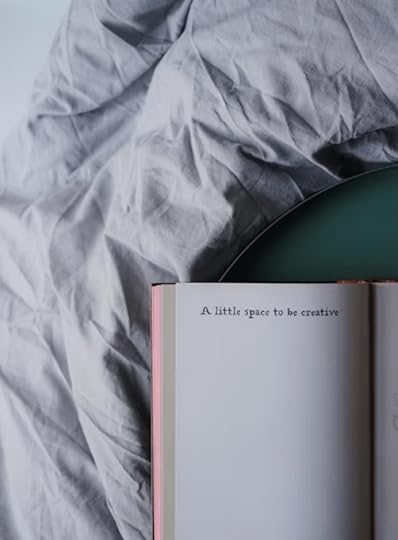 UNSPLASH: https://unsplash.com/@heftiba
UNSPLASH: https://unsplash.com/@heftibaA Different Way to See
It happened during an ordinary phone call. I was speaking with a long-time friend who was struggling with an issue and, as friends do, we were working through it together. I offered what felt like simple encouragement—just words that came naturally in conversation, nothing I had labored over or carefully crafted.
“That’s exactly what I needed to hear,” she said, her voice brightening. “I’m adding this to my collection of Mande-isms.”
“Your what?” I asked, genuinely confused.
“My Mande-isms,” she repeated. “I save all the wise and encouraging things you write to me in our emails. I keep them in a special folder so I can reread them when I need to hear those words again.”
I was shocked into silence. This was news to me—completely unexpected.
“They could be a book, you know,” she continued. “The things you write to me have gotten me through some really dark times.”
I sat there, phone pressed to my ear, trying to process what she was saying. I had no idea I had this impact. Heck, I didn’t even remember most of what I’d written! These were just emails between friends, words of comfort offered in passing, thoughts shared in the margins of a busy life. I hadn’t seen them as creative work. I hadn’t recognized them as expressions of my voice, my perspective, my art.
But to her, they were treasures—pieces of wisdom worth saving, worth returning to, worth collecting. To her, these casual offerings were valuable creations.
And just like that, something shifted. I began to see my life through a different lens. All those emails written late at night after the animals were settled. All those text messages sent between errands. All those conversations had while multitasking. They weren’t just communications—they were creations. They weren’t separate from my caretaking responsibilities—they were woven into the fabric of my daily life.
It wasn’t that I had stopped being creative. It was that I had stopped recognizing my creativity because it didn’t look like what I thought creativity should be. I had been so focused on what I couldn’t do—the novels unwritten, the paintings unmade—that I had failed to see what I was already doing.
What if creativity isn’t something we schedule? What if it’s not something we do separate from our lives, but rather how we live our lives? What if every interaction, every word of encouragement, every moment of connection could be approached as a creative act?
I realized then that I didn’t need to find time for creativity. I needed to find creativity in time already claimed.
I had failed to see what I was already doing. And yet, wasn’t this always how women had created? Not in the grand studios or uninterrupted days I had imagined, but in the stolen moments, the margins of responsibility, the spaces between caregiving and survival? Maybe I had been looking in the wrong places for proof that my creativity was alive. Maybe it had never left me at all—it had simply adapted, as it always had for women before me.
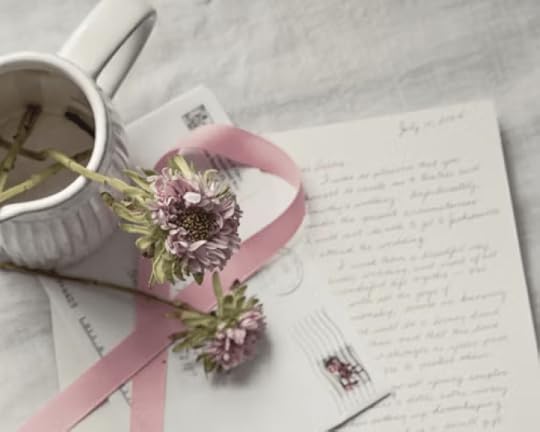 Debbie Hudson – Unsplash
Debbie Hudson – UnsplashThe Creative Lives of Historical Caretakers
I’m not the first woman to face this challenge. Throughout history, women have found ways to weave creativity into lives consumed by responsibility.
Consider Emily Dickinson, whose nearly 1,800 poems were often written on scraps of paper or even envelopes while she managed her father’s household. Her poetry wasn’t composed in grand, uninterrupted stretches of time in a dedicated writing room. It emerged in moments stolen between domestic duties. She wrote on whatever was at hand—recipe cards, the backs of letters, small pieces of stationery. Her poems weren’t just personal musings; they were deep connections to the world around her, often sent as letters to friends and family. Her creativity wasn’t separate from her life—it was how she processed her life.
Or think of Harriet Powers, born into slavery in 1837, who couldn’t read or write but told stories through her quilts. While caring for her own children and working as a slave, she created intricate appliqué quilts that told biblical stories and recorded historical events. Her creativity wasn’t a luxury—it was essential to preserving her culture and expressing her humanity in a world that denied her basic rights. Her quilts, now hanging in the Smithsonian, weren’t created in a studio with unlimited time; they were stitched together in moments between endless labor.
The Brontë sisters—Charlotte, Emily, and Anne—weren’t encouraged to be writers. They were expected to be governesses or wives. As children, they created tiny books filled with stories written in microscopic handwriting to keep them secret from adults. Even as adults, they originally published under male pseudonyms because women writers weren’t taken seriously. Their works—Jane Eyre, Wuthering Heights, The Tenant of Wildfell Hall—were born from years of storytelling in stolen moments, written between teaching duties and household responsibilities.
These women didn’t wait for permission to create, nor did they wait for that mythical stretch of uninterrupted time. They created within the constraints of their lives, finding ways to express themselves through the very acts of caretaking and domestic work that filled their days.
I’ve seen this play out in modern lives as well. A friend of mine started documenting the funny things her daughters said. She didn’t have time to write the novel she dreamed of, but she could jot down a quick quote on her phone. Over time, these collected quotes became a book of wisdom from children’s perspectives—a creative project that emerged from her role as a mother, not in spite of it.
Another woman I know, caring for her elderly parent, began taking one photograph each day of something beautiful in their home. These weren’t carefully composed shots taken with expensive equipment; they were quick snapshots on her phone—a shaft of light across her mother’s hands, the pattern of pills arranged in a weekly organizer, the worn pages of her mother’s favorite devotional. Over time, these photographs became a visual essay on aging, care, and the beauty found in difficult moments. Her creativity wasn’t separate from her caretaking—it was how she processed and found meaning in it.
A single mother I know, overwhelmed with parenting responsibilities while trying to maintain her artistic practice, found a creative solution. Rather than lamenting her lack of studio time, she began setting up art projects to do alongside her young son. These weren’t just activities to keep him occupied—they were thoughtfully designed explorations of color, texture, and form. As they created together, she not only produced art pieces of her own but also developed valuable teaching skills. Over time, she compiled these projects into a curriculum for teaching art to young children, transforming what could have been seen as an interruption to her creative life into a meaningful artistic evolution. Her creativity wasn’t separate from her parenting—it was how she enhanced her connection with her child while remaining true to her artistic self.
These women weren’t waiting for permission to create—they were living their art. They found ways to express themselves within the constraints of lives filled with responsibility, not by carving out separate time for creativity but by bringing creativity into the time they already had.
 Carli Jeen – Unsplash
Carli Jeen – UnsplashWhat Are You Already Doing That’s Creative?
As I began to see my own life through this new lens, I started to notice the creative acts I was already performing every day. The way I rearranged books, plants and candles on the coffee table when cleaning. The commiserating funny stories we women tell each other about our husbands and families. The words of encouragement I speak to friends and family in need.
These aren’t separate from my caretaking responsibilities—they are how I fulfill those responsibilities. They are how I bring myself—my whole self, including my creative spirit—to the work of caring for others.
What about you? What are you already doing that’s creative?
What do people come to you for? Is it your ability to offer the perfect words of encouragement at just the right moment? Your knack for making a simple meal feel like a celebration? Your talent for helping others see situations from new perspectives?
Where does creativity naturally show up in your life? Is it in the notes you leave in your child’s lunchbox? The way you arrange flowers cut from your garden? The stories you tell at bedtime? The solutions you devise for family conflicts?
What if, instead of dismissing these things as “just what you do,” you recognized them as creative acts? What if you honored them as expressions of your unique vision and voice? What if you recorded them—in a photo, in words, in a song, in a quick sketch—that could be compiled over time into a body of work? Whether for publication, incorporation into a longer work, for social media shares, or just to create a lasting legacy for your children and grandchildren?
You might be thinking, “But these aren’t real creative projects. They’re just everyday things.” That’s exactly the point. Creativity doesn’t have to be separate from everyday life. It can be how you approach everyday life.
The mother who turns bath time into an imaginative adventure with her child isn’t just getting through another parenting task—she’s creating a narrative experience. The caretaker who finds ways to make medication time less frightening for an elderly parent isn’t just completing a duty—she’s designing an experience. The person who writes a heartfelt note to a friend in need isn’t just being kind—she’s crafting words that heal.
These aren’t just nice things to do. They’re creative acts. They’re expressions of your unique perspective and approach to life. They matter.
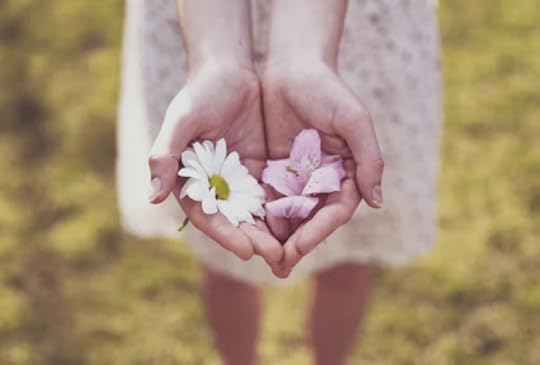 Unsplash: https://unsplash.com/@alesmaze
Unsplash: https://unsplash.com/@alesmazeIdeas for Infusing Creativity into Everyday Life
Once I began to see my life through this lens, possibilities opened up everywhere. I started to look for ways to bring more intentional creativity into the caretaking work I was already doing. Not as additional tasks that would overwhelm me further but as ways to be more fully present and engaged in the life I was already living.
If you’re a writer at heart, like me, words are your natural medium. Look for ways to weave language into your daily interactions. Leave notes for your loved ones—not just functional reminders, but words that surprise and delight. The Post-it on the bathroom mirror that says “Your smile makes the world brighter” for your teenager. A beautiful hand-written encouragement or expression of love and care on pretty paper snapped with your phone and texted to a friend or lover. The text message to your spouse that captures a beautiful moment from your day. The journal entry that transforms a frustrating caretaking experience into a reflection on patience and growth. Or even just a sentence from that journal entry. Or email. Or what was said out loud.
These aren’t grand creative projects that require hours of uninterrupted time. They’re small acts of creativity that fit into the spaces between responsibilities. And over time, they add up. That journal of reflections could become a memoir of caretaking. Those Post-it notes could be photographed and become a visual essay on parenting. Those text messages could be compiled into a love letter to your partner.
If you’re visually oriented, look for ways to bring beauty into everyday tasks. The way you arrange food on a plate for a family meal. The color-coded system you develop for managing household tasks. The thoughtful way you select and display family photographs. These aren’t just functional choices—they’re aesthetic ones. They’re expressions of your visual sensibility.
Take a moment to document these visual creations. A quick photograph of a beautifully arranged meal before it’s eaten. A snapshot of the organizational system you’ve developed. These images aren’t just records—they’re a body of work that reflects your unique way of seeing the world.
If you’re a natural storyteller, look for ways to weave narrative into your daily interactions. The bedtime stories you invent for your children. The way you recount the day’s events to your partner. The family histories you share with aging parents to help them connect with their memories. These aren’t just conversations—they’re oral literature. They’re the stories that shape your family’s understanding of itself.
Record these stories in whatever way feels manageable. A voice memo while you’re driving. A quick note in your phone. A dedicated notebook where you jot down the bones of the story before you forget. Over time, these collected stories could become a family history, a children’s book, or simply a treasure trove of memories that might otherwise be lost.
If you’re someone who naturally gives advice and support, recognize that this too is a creative act. The way you listen and respond to others’ struggles. The perspective you offer that helps them see their situation differently. The comfort you provide that helps them feel less alone. These aren’t just acts of kindness—they’re acts of creation. You’re creating connections, insights, and moments of healing.
Consider capturing the wisdom that emerges from these interactions. Not the private details but the universal truths that might help others. A notebook of reflections on what you’ve learned from supporting others. A collection of the phrases that seem to offer the most comfort. A blog post that shares an insight that emerged from a difficult conversation. These aren’t just records—they’re a body of work that reflects your unique perspective on human experience.
Whatever your natural creative inclination, look for ways to bring it into the life you’re already living. Not as something separate that requires additional time, but as a way to be more fully present and engaged in the responsibilities you already carry.
Show Up as Your Creative Self
What if you didn’t have to fight for time to create but instead let creativity exist inside the life you’re already living?
What if every note, every small act of beauty, every loving moment wasn’t just an obligation—but a form of art?
What if creativity isn’t something you do in addition to your life but rather how you live your life?
I look for ways to bring creative expression to caretaking – writing a poem for a friend, sketching a quick birthday month flower with its special qualities for my niece, sending written words of encouragement on beautiful paper with a wax stamp and popping them in the mail for family in need, recognizing the creative ways in which I manage different dog personalities and reflecting on the beauty of differences that oftentimes becomes words of inspiration and motivation that can be shared or weaved into longer narratives.
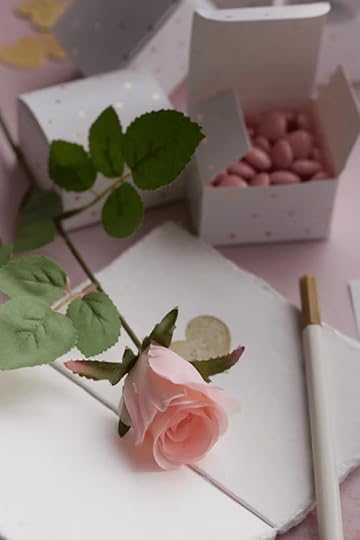 Unsplash: https://unsplash.com/@olivie_strauss
Unsplash: https://unsplash.com/@olivie_straussThese aren’t separate from my life of caretaking—they’re how I experience and process that life. They’re how I bring my whole self, including my creative spirit, to the work of caring for others.
And something remarkable has happened. Instead of feeling like my creativity is being sacrificed to caretaking, I’ve begun to see caretaking itself as a creative act. The way I solve problems, the stories I tell, the systems I develop, and the beauty I create in everyday moments—these aren’t distractions from my creative life. They are my creative life.
This doesn’t mean I’ve given up on dedicated creative time entirely. I still write when I can. I still draw when the opportunity arises. But I no longer feel that my creativity is on hold until I can find that mythical stretch of uninterrupted time. I no longer feel that I’m not a “real” writer or artist because I can’t dedicate hours each day to my craft.
Instead, I’ve come to understand that creativity isn’t just what happens when I sit down at my desk with a blank page. It’s also what happens when I figure out how to make a frightened animal feel safe. It’s what happens when I find a new way to connect through images and words with those I love. It’s what happens I relate to those around me who have suffered through the burdens, loss and tremendous love of caring for and losing my mother to the disease of dementia.
Creativity doesn’t have to be a separate project. It can be how you move through the world.
So I invite you to look at your own life differently. See the creative potential in the responsibilities you already carry. Recognize the artistry in the care you already provide. Find ways to bring your unique vision and voice into the everyday acts of living and loving.
You don’t have to wait until you have more time, more freedom, more support. You don’t have to put your creative self on hold until your caretaking responsibilities ease. You can be both caretaker and creator, not by doing more, but by bringing more of yourself to what you’re already doing.
Your creativity hasn’t disappeared. It’s just waiting to be recognized in the life you’re already living.
CREDITS: cover photos: https://unsplash.com/@goian
February 25, 2025
Siren Songs: Mermaid Poetry for the Ocean-Hearted
Between moonlit waves and midnight tides, mermaids sing their ancient songs. These watery realms have always called to those of us who feel the pull of something deeper, something shimmering beneath life’s surface.
“Sister Sirens” flows from this space—my celebration of the kindred sisterhood I share with fellow creative sirens of the seas, my call for you to continue your creative mission, my assurance for you to know I hear you, Sister Sirens. Keep singing.
If you do not see the video, click here: https://mandematthews.com/poetry/siren-songs-mermaid-poetry-for-the-ocean-hearted/ PHOTO: Polina TankilevitchSister Sirens
PHOTO: Polina TankilevitchSister SirensSometimes, a person comes along,
and I recognize them by their fish scales.
Shiny,
sparkling things
full of magic.
It’s how I recognized you.
You gazed at me
from beneath salted lashes,
a sea alive in your eyes,
stories swimming in their depths.
We are born of that sea,
you and I.
Shoals of hope.
We sing the language of sirens.
Sisters.
Witches of words.
Our hearts are tender things,
not meant for the two-legged world
of brash lights and constraining demands.
We are meant to ride waves.
We are meant to buoy the drowning.
We are meant for deep dives.
Finding pearls.
Sunken cities.
Lost species.
When we return to the surface,
we give them our treasures,
combed from the ocean floor.
We risked riptides,
barracudas,
and tsunamis
to drag them ashore.
We present them with innocence,
paddling the coastline.
Their acceptance ebbs and flows.
Sometimes, they are harbor cruises,
pointing and applauding.
Sometimes, they are trawlers,
exploitation poised on hooked lines.
Sometimes, they are whaleboats,
harpoon cannons ready to fire.
And sometimes
the two-legged world
doesn’t see us at all,
and, as lochs of the sea,
that hurts.
We expect our embrace
to be welcomed,
not criticized.
Revered,
not rejected.
Noticed,
not unseen.
But I need you to know,
I hear you,
my siren sister.
You enchant me,
swishing your mermaid tail,
washing fairytales
to the shores of my heart.
Continue your
quiet swim
along seaways,
catching currents,
riding the open ocean.
Born of seafoam,
you are a seashell
sounding
for whoever delights
in picking you up.
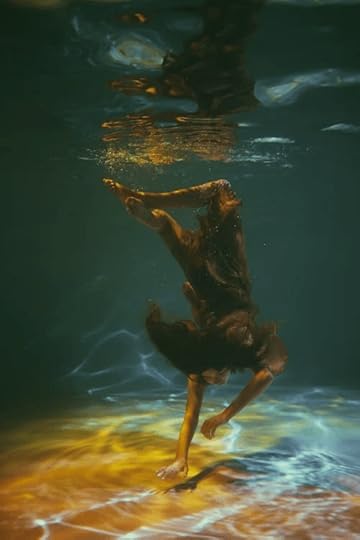 PHOTO: Polina Tankilevitch
PHOTO: Polina TankilevitchI hope “Sister Sirens” reminds you of your magical mission and that our creative spirits are stronger than the currents we may face.
What mermaid dreams swim through your mind? What songs do you hear in the shells you hold to your ear? Share your ocean-inspired whispers in the comments below…
January 9, 2025
If I Were Your Fairy Godmother #mustread #poemforwomen
If I were your fairy godmother,
I wouldn’t have to wield a wand for my spell.
I’d tell you that you shimmer
brighter than stardust,
glimmer more gallantly than
glass slippers.
You are more dazzling
than ten thousand treasure-filled tiaras.
If I were your fairy godmother,
I wouldn’t have to magically mold a pumpkin coach.
I’d tell you your wings
are well woven for flight,
constructed from the
compassion of your heart.
They’ll carry you to
whatever destination you desire.
If I were your fairy godmother,
I’d tell you fables and fairy tales are for children.
But you are a phenomenal woman
with the kindness of storybooks,
the courage of heroines,
the might of mystical dragons,
And the intelligence
and resilience
to conjure your very own
Ever After.
September 13, 2024
The Rewritten Princess
If you’re reading in your email and don’t see the video, you can click here to watch the video.
Once upon a time, I tell myself, there was a girl with hair full of ash and cheeks round as snowballs. She lived in a castle turret in Brooklyn where no one, no one at all, saw her for who she truly was.
She was a princess. But everyone believed she was only an unnamed character in an unpublished story. Faded ink marks on torn paper stuck in a scrapbook in some old woman’s attic.
This princess was sad, for even she had forgotten her own name. Her purpose, even.
This princess had lived a lifetime of chores, the overlooked and unappreciated kind. The cooking, cleaning, scrubbing. And princesses, in this day, were all expected to get jobs, pay bills, and put roofs over heads. Be mothers and wives and friends and caregivers and career women and volunteers and advocates and worshippers and coaches and mentors and, and, and….
They were expected to be perfect.
And that, believed the princess, is what made her Nameless.
But I don’t like this story, I say. I don’t like it one bit. I want a story where the princess is a princess. Where people see she’s a princess.
In fairy tales, princesses are always recognized as princesses. Even when they come drenched on stormy nights, get lost in forests, sleep on moss beds, or dream for eternity, lips poised for kisses.
And perhaps that’s the problem. Those princesses, the ones I grew up with, are passive and polite. Kind and courteous. Never a cross word sparks from their tongues. They are waiting…
Always waiting…
…for godmothers or princes or witches.
But that’s not this princess. Sometimes, this princess’ anger gets the better of her. Her sharp tongue strikes. She’s kind but cruel. Generous but greedy. She reminds herself those storybook princesses aren’t real. They are fantasy concoctions. Societal ideals.
They are not flesh and blood and emotion and experience. She can’t possibly live up to their infallible nature.
And yet, I say, we believe they are real.
Measuring sticks by which we draw our own worth or lack thereof.
But, the one thing this princess does have in common with the other princesses is waiting.
She’s been waiting, see, for permission. For trumpeters to arrive and announce her name so she may descend the stairs to the dance floor. For the glass shoe to fit her plump foot. For a fairy godmother to wave her wand and say, “Get out of those rags, child, here is your ball gown, your carriage, your crystal shoes, your ever after!”
That scene in Cinderella. Remember it? When the Fairy Godmother waves her wand and Cinderella spins and spins. Magic stars transform the poor cinder girl dressed in rags into a breathtaking princess with a couture gown fit for a queen.
That is the moment this princess has been waiting for. For years and years. A lifetime, really.
But now, now the princess is old. She should have become Queen. She should be a Dowager. Or a wise witch of the forest. But all the waiting for someone else to announce her, transform her, grant her a wish…
So, this princess, I say. This one has grown weary of the wait. This princess decides it doesn’t matter how others see her. She will look in the mirror, see herself, and write her own story.
Stop waiting. It’s time to make your own fairy tale.
Once upon a time…
Go ahead, write it…

CREDITS:
Written By: Mande Matthews
Music: The Price of Freedom
Music by Zakhar Valaha from Pixabay
Photos: Depositphotos.com
Photomanipulation & Video: Mande Matthews
August 28, 2024
Medieval Rose – A Healing Bedtime Story for Adults
Let me tell you a story about a medieval rose…
But first, you can listen to the audio version by clicking on the video below, or read beneath. (If you’re reading in your email and don’t see the video, please click here to watch/listen: )
Medieval Rose – A Healing Bedtime Story written and narrated by Mande MatthewsLet’s begin.
Medieval RoseLet me tell you a story of a medieval rose. You might think that’s an odd sort of story—a tale of a rose? A rose isn’t a person but a thing. How could it have a story?
But, and you may or may not agree, roses are often described as the most special bloom of them all. Worshipped for centuries, they came into their height of popularity in the Middle Ages. They were talismans, medicinal healers, gestures of affection, and their perfume evokes feelings of endless and unconditional love. And some, such as this particular rose, even possessed what many would call magical powers. But wait, I’m getting ahead of myself. Let’s back up for a moment.
Hello. I’m Mande Matthews, and I’d love for you to come on a journey with me. A quest, really. An adventure of sorts. A pilgrimage of love. Where we discover the ability to deeply love those around us by loving ourselves first.
So, sit back, relax, and take a few long, languid breaths. In. Out. In. Out. Let the day go. Melt away all of your worries and anxiety. Leave your to-dos and responsibilities behind. Just for a moment. Don’t worry. Everything will be there when you return, so there’s no need to think about it now. This is your time. There’s nothing else to be done, but imagine.
Close your eyes, and let’s begin our quest for the Medieval Rose. As you rest, visualize traveling back…back…back to a romantic era. Picture a time in the 1400s against a Western European landscape. A beautiful castle rests high on a grassy hilltop. The Keep towers into fluffy clouds and a baby blue sky. Do you see it? There, on the horizon? Beneath this castle spreads a lush garden with the most curious rose planted in the center of this walled and flourishing palace oasis.
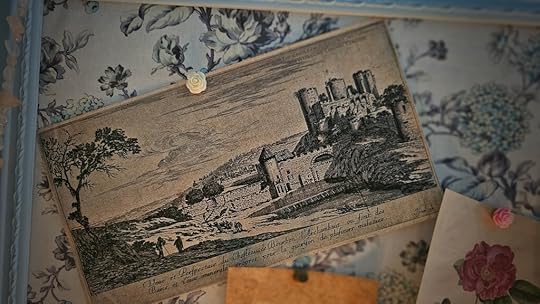 The castle of Bourbon l’Archambout. Etching. https://commons.wikimedia.org/wiki/Fi...
The castle of Bourbon l’Archambout. Etching. https://commons.wikimedia.org/wiki/Fi...This queen among flowers is rooted in the center of a splendid flower court of marigolds, lilies, daisies, and violets. Her blossoms are as odd as she is—crimson bottoms blending into tangerine oranges, then sunshine yellows that burst into soft, sunset pinks. Her glossy green leaves cradle hundred-petal blooms. Her deep emerald stems are entirely and utterly thornless. She’s everblooming, no matter the weather or season. Spring. Summer. Autumn. Winter. Sunshine. Snowstorm. It doesn’t matter. She stays in all her glory, perfectly blooming, never fading. Her scent blankets the entirety of the hill, palace included, wrapping everyone in such an intoxicating fragrance that it’s like being taken up in your doting grandmother’s embrace.
But the most peculiar thing about this rose? She radiates pure love. Magic, one might say. Even the other flowers and the grass and ivy feel it. Everyone who comes near feels it. And they thrive in her presence.
But more on her magic in just a little while.
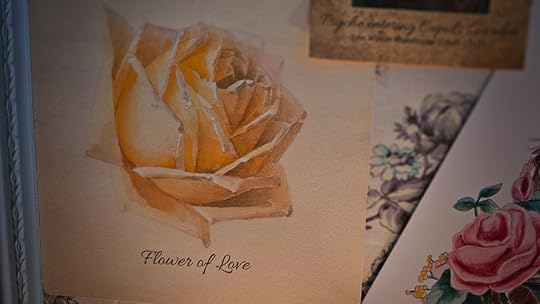 Study of a Rose – Wikimedia
Study of a Rose – WikimediaThe queen of all roses sits in that garden, peacefully, the wind gently swaying her stems and leaves. Over eight feet tall, she stretches so high up she can see over the stone garden walls and down into the valley’s village below. But the valley is not as loving and beautiful and comforting as the palace garden up high.
For, down in that valley, the village teems with the less fortunate. Far down cobble, then dirt, then a muddy lane that winds past families, villagers, merchants and beggars alike, there on the end of the street, barely a street at all, just a muddy path, in a thatched roofed house with a failing garden out back, lives a young girl and her kin.
The girl has rosy cheeks as soft and beautiful as the pink tips of the Queen of Rose’s petals. And, as you may have already guessed, her name is Rose.
Her sparkling eyes speak of so much potential.
Yet she cries, sadly, there on her knees in a patch of dirt behind her home. Beside her, turned on its side, lay an empty bucket, and next to that, shriveled leeks, wilted broad beans, stunted parsnips, struggling rosemary and sweet bay, and more dying things.
Rose wipes her tears with the arm of her tattered tunic. “I’m sorry,” she says to each plant, propping stems upright with her fingers, only for them to fall limp once she removes her support. It is Rose’s job to tend the garden. But no matter how hard she tries, she fails, leaving her with thirsty plants that will never ripen for harvest and feed her hungry family.
Rose and her siblings are parentless, having died long ago from fever, but her brother and sisters work hard to keep them surviving. Her brother hunts, mostly vermin, but enough to set their table even if the meals are tough and bony at best. Christiana sews well enough to trade for milk and cheese and even cabbage and leeks. Her eldest sister, Sarra, has a way with people, a charm, one might say. She’s always first in line for trenchers from the palace. Though the cast-offs are free to the poor, her sister manages a coveted first-in-line position, garnering her the tastiest leftovers. Meat-soaked bread occasionally contributes to their daily meal, a nutritious treat for the siblings. Rose’s contribution should be the bounty of her garden; alas, she cannot grow enough for even one kettle of pottage, let alone a lifetime of meals.
The garden is a meager plot, surrounded by forest land. The bracken and bramble within the woods are thick and invasive; there isn’t a berry, nut, or mushroom to be found. You can’t even reach the ground with such wild coverage, let alone forage it. Still, Rose is not doing her part. For that, she feels dreadful. It isn’t fair that she lets her brother and sisters carry the burden. The thought of disappointing them brings a rush of tears to her eyes and a tremor to her chest. She chokes back sobs. She bends lovingly. Reaching gently.
Rose caresses the brown, wrinkled bay leaf and sniffles. “I’ll try again. I promise. I’ll try harder. I don’t know what happens. I travel back and forth from the well so many times a day until I drop from exhaustion. Yet I don’t manage to bring you even one speck of water. And there hasn’t been a lick of rain all summer long.”
Rose picks up her bucket and dusts off her apron. She wobbles, unsteady on her feet, so tired she can barely stay upright. Her lips look parched. Dry and cracked on the bottom as if she hasn’t drunk a sip of water for a week. She heads out of her pitiful garden, through the creaky front gate, and up the winding road to the village well.
When she arrives, a boarded well greets her when just this morning, she’d pulled water from its depths. “No. No. Not possible.” She looks around for help, but no one pays her any mind. “It can’t be. What will I do? I cannot water the garden with air.”
Hopeless, she slumps down the wellhead’s bumpy side, sits on the ground, and cries.
“Now, none of that crying, you.” A man’s voice interrupts mid-sob. “This one’s gone dry, but there’s another ’bout eight furlongs up the street.”
Rose glances up at the man, a laborer by the look of his short-sleeve tunic and heavy-soled boots, not to mention the mallet, poles, and rope he cradles in one arm.
“Eight?” asks Rose, defeated. “That far?”
“You deaf? Yes, eight. That’s not so great a distance to travel in times of drought. Be grateful for any water at all, and best use it wisely.”
“But I’ve already traveled a league to get to this one. It’s so very far from home.”
“Well, there’s nothing to be done for it. You can’t squeeze milk from a dead cow, so get you gone, and you might chance returning home before dark. Besides, got my work to do, and you’re sitting in my way.” The laborer gestures for her to get up so he can go about his business cordoning off the barren well.
Rose licks her cracked lips and follows the direction of the man’s finger. She pushes up to her feet, legs trembling. How long has it been since she’d drunk any water herself? Days, she imagines. It’s just every time she fetched water, it seemed someone else needed it more than she. Before she knew it, her bucket was empty. She never thought of refusing them. She didn’t want to see anyone suffer. She wanted to help.
At first, giving made her heart happy. It felt like the right thing to do. So she gave. And gave. And gave. But a funny thing started to happen. The more she gave and the less she took for herself, the more overwhelmed, hopeless, and depressed she felt. But she kept right on giving. It was how she showed her love, wasn’t it? Until she was left with nothing but a parched mouth, a growling belly, a dying garden, and a tear on her rosy cheek.
Rose presses onward nonetheless, heading farther up the hill. When at last, Rose reaches the second well, when she dips the bucket down into its depths, when she takes just a tiny lick for herself from the ladle and looks up the hill to the palace, she sees, for the first time in her life, a most wondrous sight.
A multi-colored rose stretches up over the garden wall. The rose, it’s true, is stunning. So unusual in its color. So gigantic in its blooms. So graceful as its stems reach higher and higher. Rose can even imagine how sweet it must smell.
But it isn’t the beauty of the flower that strikes her. It’s a feeling. An immediate sense of peace, of calm, of comfort sweeps over her. A feeling like being caught up in the most loving hug, of being wrapped in the warmest blanket and held near a crackling fireside. Of knowing, just knowing, not a worry in the world exists outside of that warmth and contentment and love. That, Rose imagines, is what true love must feel like.
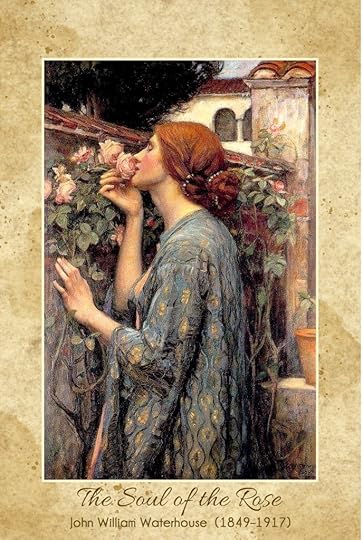
All this time, Rose thought she loved her brother and sisters. She felt she showed love and kindness to the villagers. She assumed giving them everything they ever asked of her was love. But now, here, in the sight of that magical rose, she realizes love is something entirely different. She can’t quite place how it is different. But different, it is.
She wants to run as fast as her skinny legs can carry her, through the streets and up the hillside, climb over that garden wall and sit there beneath that glorious creation so she can understand what love truly is. It’s what she, herself, longs to give.
“There you are! I’ve been looking all over for you.” The sound of Warin’s voice breaks her concentration. Rose hesitantly tears her gaze away from the hilltop and turns toward her brother.
“Christiana’s ready to start the porridge. Sarra needs water for washing. And I need to rinse my squirrel before skewering it on the spit. We’ll eat past midnight if you don’t hurry up about it.”
“I’m sorry,” says Rose.
“I have to return these trousers and collect Christiana’s wage. Oh, do me a favor,” he says. “Do be a dear, and rinse the squirrel before I get back, so it’s ready. It’s sitting in front of the fire. You won’t miss it.”
“Of course, I’ll be quick.”
“You’re such a good girl, Rose.” Her brother leans down, for he is quite tall and Rose quite small, and affectionately plants a kiss on her brow. “See you tonight.”
Rose goes about her business, scrambling back down the road on weakening legs, water sloshing as she struggles to keep the precious resource inside. She swallows hard, her throat a desert. She hadn’t even thought to drink her fill from the well before she left.
She has to hurry, you see. Her brother and sisters need her.
But even engrossed in her chore, Rose does not forget about the Queen of Roses sitting up high in its palace garden. Thoughts of its beauty and comfort, and yes, love, sweet love, warms her chest.
On the way, the butcher’s wife, cradling a swaddled infant to her chest, calls out, “My sweeting, my darling, Rose, can you spare some of that water there for my wee one? The well was blocked off when I managed to reach it, and as you know, the creek nearby is all dried up. And with my new babe, it’s so hard for me to get out and about.”
Rose stops and thinks about telling the butcher’s wife about the new well eight furlongs away from the old one, but her other son, the wee Jacob, totters to his mother’s side, thumb in mouth, tears in his eyes, and Rose cannot resist.
She sets her bucket down and waves the butcher’s wife forward. The butcher’s wife, of course, has a ladle and waterskin at the ready, and Rose kindly obliges.
Once on her way again, Rose hasn’t traveled a hundred feet before she hears a scream. The candlemaker stumbles out of his door directly in front of her, shaking his hand violently. When he spots Rose, he stops, red-faced, and pleads, “Oh, do be a dear one. Pour a little water on my finger. I’ve burned it, you see?”
He stretches out a crimson forefinger, already beginning to blister. Without a thought, without hesitating, Rose lifts the bucket and pours. The candlemaker sighs. “God bless you, youngling. You are such a precious soul.”
Rose smiles sweetly and hurries back on her way but starts to fret. Nearly four inches of water has already gone from her bucket. Never mind, she thinks. What’s done is done. If I get home without sharing any more, there will be enough.
But then Rose spots a dog. A wretched-looking thing. He lays panting on the ground. He whimpers and sniffs toward the bucket as Rose approaches. He wrestles himself upright, tail between his legs. The sides of his flanks sink inward, and there isn’t a spit of water to be found nearby. Rose’s heart drops to her knees.
“You poor boy,” says Rose. “Isn’t there anyone here to care for you?” She glances around, but the villagers go on about their business. Rose kneels and scoops up a handful of water with the cup of her hand, calling, “Here, boy. Come now. Drink up.”
The dog wags his tail, totters over, ears perked, and eagerly laps. One handful isn’t enough, so Rose gives him another. When he is satisfied, she pats him on the head and is once more on her way.
When she finally arrives home, both of her sisters rush toward her.
“At last!” says Sarra, crumpling her Sunday dress in her hand. “If I don’t get this washed, it won’t dry before morning, and I’ll have nothing to wear for the handout line at the palace. Tomorrow’s the first banquet in a fortnight. We won’t want to miss it. I can’t beg in a filthy tunic. Who would give me the best spot in line?” It is true. Rose suspects Sarra’s presentableness and charming smile have everything to do with her ability to collect handouts.
Rose hands the bucket over, and Sarra pours half of what remains into her washing tub. She kisses Rose on the cheek and smiles. “You’re such a dear,” says Sarra and hustles away to do her laundry.
“Come, Rose,” says Christiana. “I’ve got leeks and cabbage ready in the pot but need water to bring it to a boil.” Christiana hurries her sister to the fireside. Rose dutifully pours water into the kettle. Once filled, Rose looks back into her bucket. Barely any left.
Her brother’s skinned squirrel lays on the stool before the fire, and Rose carefully rinses it, using as little of her precious water as possible.
By the time she pours a glass for her brother and two for her sisters for the daily meal, there isn’t even one drop remaining. Not for her. Not for her garden.
Once again, Rose is left with nothing at all.
After dinner, the siblings climb into their shared hay-stuffed mattress by the fireside, weary from the day, and go to sleep. All except Rose. She shivers at the edge of the bed, her back exposed to the night air as the bedclothes are not generous enough to cover all four siblings. When the fire dies, and darkness lurks—for the family is too poor for such extravagances as candles—Rose sneaks from the bed and tiptoes out into her garden. Even in the moonlight, the suffering of her withering plants is all too clear. She slides to the ground and sits in the dirt among them. She folds her bony legs to her chest and wraps her arms around her knobby knees, hugging them tightly. She closes her eyes and asks the cloudless night, “Whatever shall I do?”
Suddenly, like a sparkling star in the evening sky, the image of the Queen of Roses on the palace garden hilltop pops into her head, and Rose knows what she must do.
Before daybreak, Rose creeps out of the house before her siblings wake, but she isn’t carrying her bucket this time. Instead, she heads straight for the palace garden. It isn’t an easy climb.
With one goal in mind, she slipped just enough cheese in her pocket and collected just enough water for her waterskin at the well to sustain the hike. As she was up before the bustling villagers, she’d managed to make it to the hilltop without any requests.
Now she lays panting, leaning up against the six-foot-high garden wall, sipping the dregs of her water and nibbling the last bite of cheese.
The sun rises high, announcing midday. Rose can imagine that over that wall, she’ll be greeted by the Queen of Roses if she can fathom how to get inside.
After finishing her snack, she circles the wall, reasoning that she’ll find a gate or arch, except she finds no such entry. Neither does she find a tree to climb or rocks to prop herself upon. Next, she tries wedging her fingers between the stones to hoist herself over, but she comes tumbling right down to the ground. The sun races across the sky, and before she realizes it, hours have passed. Rose is just about to give up, thinking her quest a folly when she hears a voice.
“She’ll see you now,” it chirps.
Rose glances this way and that, but there is nary a person to be found.
“Hello,” says the voice, tiny and lyrical. “Can you hear me down there?”
“Yes,” says Rose, “But where are you?”
“Look up,” says the voice.
When Rose lifts her head to the top of the wall, a nightingale stares back at her. He chirps a merry tune and fluffs his sandy-colored wings. “I am to announce to you,” he says. “She’ll see you now.”
Rose furrows her brow. “Oh, dear, I do dislike asking, so please don’t take offense. I don’t mean to be rude. But who is ‘she’?”
“The Queen, of course,” says the little bird. He whistles and flies from his perch. “Follow me.”
The Queen? Of Roses? Could it be? Thinks Rose as she runs to keep up with the nightingale, following him around the corner where he once again alights atop the garden wall. He puffs and ruffles then opens his v-shaped, sun-colored beak and sings the most beguiling tune. Rose doesn’t know what to do. There isn’t a gate or an entrance anywhere to be seen. Just a solid stone wall, some ivy, and grass.
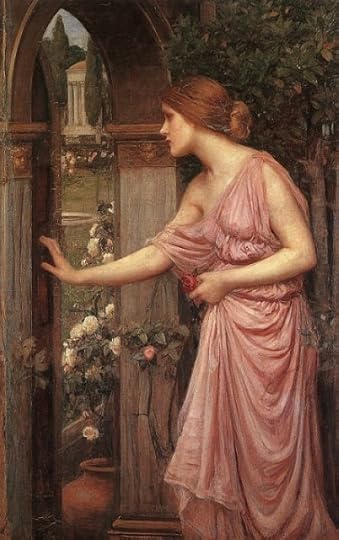 Psyche entering Cupid’s GardenJohn William WaterhouseDate: 1903
Psyche entering Cupid’s GardenJohn William WaterhouseDate: 1903But when the nightingale finishes, sparkles appear from nowhere, as if arriving on the bird’s breath. They fill the air. They thicken, brightening until they grow vibrant. Rose shields her eyes from the glare. As the twinkling lights settle to the ground and disappear, they reveal an archway. Beyond the archway spreads a garden that takes Rose’s breath straight out of her chest with a gasp. “Oh, my!”
A fairyland awaits Rose. A paradise from storybooks and fables. It seems so unreal. Talking birds. Queen of Roses. Then again, something about it seems more real than her ordinary existence in the valley village below.
Behind the walls, and below the stone tower keep, are rows and rows of impossibly bright, blooming flowers of all kinds. Rose steps through the arch. She swivels her head from one side to the other, taking in the splendor. As she steps onto the grassy ground, as she moves forward as if floating in a dream, butterflies, birds, bees, and dragonflies join her, dancing about her head, flitting from flower to flower, to her shoulders and hair, as if guiding her down the pathway. A soft yet potent floral scent drifts to her, wraps around her like an arm shepherding her. Inexplicably, the flowers bend as she passes, as if their blooms are heads, then they turn to watch her proceed. A fountain babbles close by, adding to the birdsong, buzzes, and song of the soft breeze.
About halfway down, clematis and ivy walls rustle and part, revealing the Queen of Roses sitting in the center of her courtyard.
Rose’s jaw, she is sure, is wagging as if it’s come unhinged. A menagerie of winged creatures flit to the Queen’s sides. Her stems reaching at least ten feet wide, she towers among her subjects. Those giant, hundred-petal blooms simultaneously bend, as if they are faces looking directly at Rose.
An invisible beam penetrates Rose’s chest. It’s as if a bower cradles her, rocked by her mother’s loving hand. Or being held in angel wings. Or knowing that all that exists, ever and forever, is this feeling of complete and total surrender to joy. There’s nothing to want. There’s nothing to fear. Just love. Sweet. Potent. All-encompassing love. It’s the same feeling Rose sensed in the village when she first beheld the rose, but a thousandfold more powerful. Rose could stand in the Queen’s presence, content for eternity.
“Welcome,” says a voice, and Rose knows, without a doubt, it is the Queen who speaks. Her tone is as heavenly as her scent. Full, gentle, loving with a roundness that slips around Rose, helping her to stand taller.
Though Rose is unwilling to move, too comforted, as if moving would disturb the divinity of the moment, she finds the grace to curtsey.
“I know what you seek,” says the Queen.
“You do?” asks Rose.
“It’s what you all seek. Love. True love. Unconditional and eternal.”
Tears fill the corners of Rose’s eyes. Not sad tears, but relieved tears. Tears that speak of her gratefulness that the Queen knows and cares about her troubles.
“And you shall have it. Take a clipping from my vine, here.” A cane graced with a perfect blossom bends down in front of Rose. The leaves quiver with an invitation.
But Rose steps back. “Oh, no! I wouldn’t dare cut your stem and take it from you!”
“It won’t hurt me,” says the Queen. She waves her canes and reveals hundreds upon hundreds of those breathtaking blooms. “I have much to give. You will not short me. It warms me to give when there is plenty. It’s the feeling you feel—that warmth, that comfort, that unconditional love—that’s from my abundance when I share it with you. Understand?”
Rose shakes her head. “I can’t! I dare not!” Even though her brain refuses, her fingers ache to reach out and caress the petal.
“I’ve water and nutrients to grow unbounded. I am thriving. The blooms are my bounty, so that is what I give.” The stem bends closer, bringing the blossom into Rose’s reach. “Go on,” says the Queen, “it is what you seek.”
Rose swallows to moisten her dusty throat. “Are you sure?”
“Yes,” says the Queen.
Rose gently clips the stem with her pocket knife. She expects the Queen to tremble or flinch, but instead, the Queen releases more of her exhilarating scent, bathing the girl in joy.
“Now,” instructs the Queen, “listen carefully and do as I instruct. If you don’t carry through, then all will be for naught, and your quest will fail.”
“Oh my,” says Rose, “I will do whatever you command!”
“It will not be easy,” says the Queen. “And if you fail, the clipping will die, and with it, the love you seek.”
Rose’s heart quavers. This burden she must conquer. “I will not fail you.”
“Good,” says the Queen. “Here’s what you must do. First, fill your waterskin from the fountain there. You’ll have another chance at the well in the village, but your waterskin doesn’t hold much.”
Rose nods and immediately obeys.
“The water is only enough for you to return home and keep the clipping moist until you can plant it in your garden. You must sip from your waterskin to keep up your strength. For if you lose your vitality, you will not have the energy to return home and plant the clipping, and you will fail. But, and this is most important: You cannot share the water with anyone who asks. You cannot give it away. It’s only enough for you to have the strength to carry this part of me and to keep it alive until you can plant it and use the remaining water to water it, so the cutting takes root. Understand?”
Rose thinks of all the people in the village with whom she always shares. She thinks of her brother and sisters, how she failed to fetch water for them today, and how they will have none without her. She realizes this task, indeed, will not be easy. But she nods, repeating without surety, “I will not fail you.”
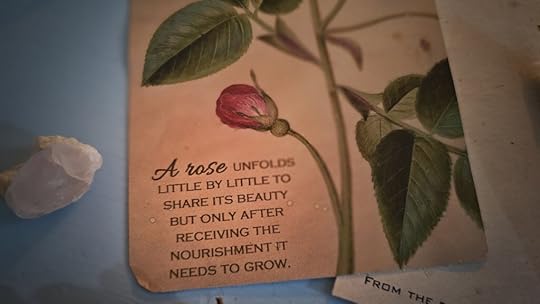
As the sun makes its descent, turning the sky into cherry pinks and tangerine oranges, Rose heads home with the cutting cradled to her chest, stem inside her waterskin like a vase. She occasionally sips from the waterskin, as the Queen instructed, whenever she feels tired or weak.
The butcher’s wife calls out, “Rose! Sweeting! Do be a darling girl and let wee Jacob sip from your waterskin. He’s so very thirsty, and I’ve not yet gone to the well.”
Rose glances down at her clipping, still upright, petals moist. Will Jacob go without if she refuses? Will the butcher’s wife be angry? Rose struggles for words but finally says, “I am so sorry. I cannot. I must get home and only have enough for the trip.”
Rose hunches and waits for the butcher’s wife to rail at her for being selfish. But a verbal thrashing does not come.
The butcher’s wife replies, “Well enough. I do feel like stretching my legs, and there’s a beautiful sunset. A walk might do my hips some good.” She waves Rose on her way, and with a sigh of relief, Rose walks on.
Not long after, the candlemaker greets her on the street. “Good day, dearest Rose,” he says. “Healing right up, thanks be to you. See?” He shows her a bandaged finger, and Rose smiles sweetly. But just before she takes her leave, he asks, “I’d be mighty obliged for a sip from your waterskin. The sun’s baked down on us all day, and I’m a bit thirsty.”
“I would,” says Rose, “but I’ve got to get this clipping home moist, or it will die.”
The candlemaker examines the clipping Rose cradles. “That is a mighty peculiar bloom indeed,” he says. But irritation creeps into his tone. “I suppose a little thirst never killed anyone, so I’ll be on my way. Good day, Rose.”
After Rose refused, the candlemaker didn’t call her dear or say “bless you” as usual. Rose’s gut clenches. Am I doing the right thing? But I must be. It’s what the Queen instructed, and I cannot fail.
Then Rose braces herself for the dog. Refusing the butcher’s wife and the candlemaker was one thing, but a helpless dog? Maybe he won’t be here. Perhaps he won’t see me, she thinks. But sure enough, the dog trots up, panting. Tail wagging. Tongue hanging. He sniffs at her waterskin, eyes glossy and round.
“I cannot give you any water today, boy. You must understand.”
The dog whimpers.
“No, no,” she says. “There must be something for you to drink elsewhere. Go on, go and find it.”
But the dog whines again. His sad eyes switch between hers. Rose nearly breaks, wanting to give in and empty her waterskin for the dog. But the words of the Queen hold fast in her memory. It cannot all be for naught. I cannot let it.
So Rose moves on, and the thirsty dog follows all the while. Her heart double-taps as she hears his paws patter behind her the whole way home. It’s all she can do to dash through the door to her house, leaving the poor animal outside.
When she enters, huffing, puffing, clutching the rose clipping to her chest, her sisters and brother hurry to her.
“Rose! Where have you been?” exclaims Warin.
“I know,” says Rose, holding back tears. “I’ve let you down. I didn’t fetch the water. You’ve gone without all day, but you see, I couldn’t. I had to do this task. It’s important. So important that I couldn’t give it up—”
“What’s that?” asked Sarra, pointing to the clipping.
“A clipping from the palace garden. I have to plant it now and only have enough left to water it, or it will die just like my garden. There’s never enough water for it. Or me. And I’m always so thirsty. And the dog, the poor boy. He’s nothing to drink at all, and I can’t help him. There’s no water for washing, or porridge, or rinsing, or drinking! I know I’ve disappointed you all. You’re angry, I know. You’ve every right….” Tears break loose. Rose sobs. “But I cannot fail.” Her shoulders shudder. She wails, her back against the door, clutching her clipping. “I must plant the clipping first.”
“It’s a most unusual bloom,” says Sarra softly.
Warin’s arm wraps around Rose’s shoulder, and he tugs her against him. “There now, sister. Don’t cry. I’ve already fetched the water for the day. When we got up and found the bucket still sitting by the door, I did it for you.”
“You did?” asks Rose, surprised.
“We were worried sick,” says Christiana. “We didn’t know where you had gone. But we’re so grateful you’re home safe now. That’s all that matters.”
“But…” says Rose, sniffling back her sobs. “You’re not angry?”
“Whatever for?”
“I didn’t do my part,” says Rose. “I left you without.” She sniffs.
“Now that I see how overwhelmed you’ve been, I know it’s not fair for you to do all the fetching for all of our chores. Tomorrow, we will fetch water together. After all, four buckets are better than one.”
“Really?” asks Rose. “You’d do that?”
“Yes, really,” says Warin.
“But what about your chores? You won’t have time to do them,” asks Rose.
“We will,” says Warin. “If we work together, we’ll find a way.”
“That’s right,” says Sarra.
“We’re here for you,” says Christiana.
Her sisters join Warin, snuggling in on all sides of Rose, and hug her.
“Now, what was that about a dog having nothing to drink?” Warin peels himself from the sibling hug and opens the door. The dog, as if on cue, trots through. Warin fetches him a bowl, and the dog laps it down, wagging his tail all the while.
“Now. Shall we plant this clipping of yours?” Christiana asks Rose.
Her brother and sisters follow Rose into her shriveled garden. Rose hunts for the central spot. “I know it might not seem like much now,” says Rose.
“You’re right. Aside from being pretty, it doesn’t look like much,” says Sarra.
“Only one stem and a bloom,” agrees Warin.
“Are you sure it was worth the climb?” asks Christianna. “It’s not a leek or a cabbage. Nothing to eat at all. How will it help?”
“You’ll see,” says Rose.
But, truth be told, Rose isn’t sure how it will help. She only knows she needs the kind of love she felt from the Queen of Roses. It was that kind of love she wants to give to others.
Her siblings assist as Rose digs the hole, plants the cane, and pours the remaining water on the ground. As the water soaks into the soil, a lovely scent explodes in the air.
All eyes light with surprise. They glance at one another and grin.
Fireflies light up around the newly planted rose bush and night birds sing. But most prevalent is the feeling of love. Is it coming from the planting or her family, or both? Rose doesn’t know, but from the bright smiles and sparkling eyes of her siblings, she knows they feel it as well.
“It was worth the climb,” confirms Warin.
“Indeed,” says Sarra.
“A hundred climbs over,” says Christiana.
***
The very next morning, Rose wakes early, snuggled between her sisters and brother. She sits upright, fearing one of her siblings must surely be left without any coverings and be cold from the night, but it isn’t so. They are nuzzled so tightly that there is enough blanket for them all.
Rose fetches water with her siblings that morning, and with four buckets, she only makes one trip. When they fill their buckets at the well, Rose makes sure to take her time and her fill before leaving so she has the strength to care for her clipping and garden.
When she returns to water her newly planted rose and garden, she discovers a miracle has occurred. The clipping grew overnight into an eight-foot bush teeming with blossoms. All around the bush, her meager garden perks up, no longer shriveled but budding new greens.
Every day, Rose, true to her word, tends to herself first, making sure she has plenty of water to make the daily trip to the well and keep up her strength. Second, she makes sure she has plenty to water her growing garden. Over time, as the rose bush flourishes, the garden extends, growing outwards, incorporating some of that wildland that sat behind them. It’s no longer filled with bramble and bracken but berries and nuts. Mushrooms grow plentifully at the bases of towering trees. They must have been there all along, but until now, Rose had not seen them.
What’s even more peculiar is that, one day, a bubbling spring appears, seemingly from nowhere; though, like the berries, nuts, and mushrooms, it must have been there all along.
With a water source right in her backyard, Rose’s garden thrives. There’s plenty for daily meals, and before long, Rose and her siblings are fleshy and healthy. Without needing to walk to the village well, Rose decides to take a bucket of water to both the butcher’s wife and candlemaker.
“What’s this?” asks the butcher’s wife.
“We have a spring in our garden now. So I brought this for you so you won’t have to walk to the well with your infant in tow,” says Rose. “And since I no longer have to make the journey, I’ve time to bring you a bucketful every day.”
Tears fill the butcher’s wife’s eyes. “Oh, sweeting! Darling Rose! Thank you so much. This means the world to my wee ones and me.” The butcher’s wife scoops Rose up, holding her in the warmest of hugs. When Rose turns to go on her way, the butcher’s wife scrambles inside and back, handing Rose a package.
“What’s this?” asks Rose, opening the bundle.
“Pork butts and pickled pig’s feet. For your generosity.”
“Oh, no,” says Rose. “I didn’t bring you the water to be paid.”
“It’s not payment,” says the butcher’s wife. “Just thanks.”
“I will take it on one account,” says Rose. “That you already have enough for yourself.”
The butcher’s wife smiles. “You are a thoughtful young girl, Rose. But yes, we have plenty. You will not short us.”
“And so I gratefully accept,” says Rose.
When Rose brings the bucket to the candlemaker, she receives much the same. The candlemaker says, “Oh, dearest Rose! You are such a blessing. Let me give you these candles in return.”
And so it goes on with many of their neighbors. They come for the spring water and leave gifts in return. So much so that Warin no longer needs to hunt for their meals, and instead of boney squirrel meat, they dine on pork and stew. Sarra no longer needs to beg for scraps at the palace. Though Christiana still sews, she has time to make new Sunday outfits for her brother and sisters. Candles light their home deep into the night, where the siblings often sit and tell bedtime stories to one another. Even the dog, who they call Hardy, has his fill. No longer scrawny, he’s a permanent addition to the family.
So, it could be said that Rose, her siblings, and the village are filled with love. The love that you give when you, yourself, overflow. And in this fairytale, they all do live lovingly ever after.
I hope you enjoyed your journey with me. May your dreams be filled with love. True love. Unconditional and eternal. The love of the Medieval Rose. Goodnight.
PERSONAL REFLECTIONS FOR THIS STORY:
Let me understand that my value is not measured by the good that I do but by the very essence of my being. I exist, therefore I am valuable. My worth is not a tally of deeds or a sum of efforts; it is an intrinsic truth, unaltered by action or inaction. I need not prove my worth through constant struggle or endless service; my existence itself is a testament to my value.
My capacity to give to others is in direct relation to my capacity to give to myself.
CRYSTALS FOR LOVE:
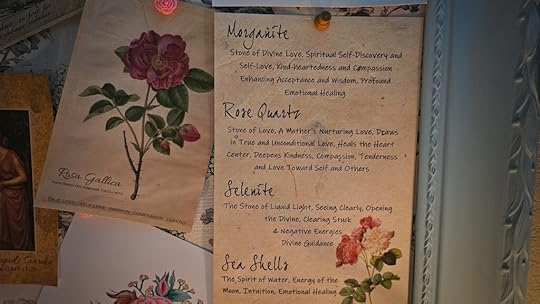 Preferred Crystal Shop: KnKMinerals.Etsy.com (ethically sourced and authenticated)
Preferred Crystal Shop: KnKMinerals.Etsy.com (ethically sourced and authenticated)Morganite: Stone of divine love, spiritual self-discovery, and self-love. Kind-heartedness and compassion. Enhancing acceptance and wisdom. Profound emotional healing.
Rose Quartz: Stone of a mother’s nurturing love. Draws in true and unconditional love. Heals the heart center. Deepens kindness, compassion, tenderness, and love toward self and others.
Selenite: The stone of liquid light, seeing clearly, opening to the divine, clearing stuck and negative energies. The divine guidance.
Sea Shells: The spirit of water. The energy of the moon. Intuition and emotional healing. (Ethically sourced only as unethical practices create trauma vibrations in shells as well as other crystals and gemstones).
CREDITS:
Story and Narration: Mande Matthews
Editing: C.K. Brooke
Video Filming, Animation, Editing – Mande Matthews
Audio Music and Sounds licensed from Deposit Photos and Capcut
Preferred Crystal Shop: KnKMinerals.Etsy.com (ethically sourced and authenticated)
Featured Art:
The castle of Bourbon l’Archambout. Etching. Wellcome Library, London. https://rb.gy/50pwoo Public Domain
Psyche Entering Cupid’s Garden – John William Waterhouse Public Domain
Soul of a Rose – John William Waterhouse Public Domain
Rosa Gallica – Johannes Simon Holtzbecher – Google Art Project Public Domain
Study of a Rose – Wikimedia.org Public Domain
I Think of You Always and Aphrodite and all graphics works – Mande Matthews
July 11, 2024
WRITERS: AI Will NEVER Replace You – Here’s Why
I am an Aquarius. A techno baby. I jive with tech—I get it. Software, at least, but I will be the first to admit that the recent generative AI developments hit me differently than anything that has come before. After the first blush of excitement wore off, a dread settled in. Oh, yes, there was the dread of job loss with the image generators (which proved true for me some ten months later as I lost some of my main streams of art income), but the fear was more than that. It was deeper. And it was profound.
If we let a program write for us, then we lose that undefinable connection to ourselves. Words, themselves, will become meaningless. Words will lose their power.
Since the written word, and perhaps before, we have, subconsciously or consciously, known the power of words. It’s the basis for my uncompleted short story, “Word Magic.” Words are magic, mystical, spiritual. They’ve been used for time out of mind to create, to help thoughts and ideas come into being. They shape our beliefs, our actions, our societies. It’s why words have been entrusted to our deepest thinkers and feelers. We venerate those words because they hold significant meaning to us. Words are not random, predictive strings, but the basis of our worldly manifestations, of everything we think, do, feel, create. They possess vibrations when wielded for us or others. They shape us—our events and reality, what we believe in, what holds our attention, what heals or destroys.
Words create.
What happens when we no longer are the creators of words and simply agree with what is written for us by a program hailed as our intellectual superior?
What do we start believing about ourselves and the world around us when we become too lazy, or take on learned helplessness, to allow ourselves the time and reflection to discover what we truly want to express? To discover the unique amalgamations in our own brains, fostered by our lifetimes of experiences and feelings? Can we use AI to help us make those discoveries or will it usurp our own internal processes because it’s faster, easier, instantly accessible? Is there an in-between that can enhance our abilities without losing our central connection to our authentic selves?
 Song of the Nightingale – Painting by Sophie Gengembre Anderson – Public Domain. I chose Anderson’s paintings for this post as she exemplifies the mastery of emotion in artwork. When I look at her paintings, I can feel the realness and authenticity of her subjects.
Song of the Nightingale – Painting by Sophie Gengembre Anderson – Public Domain. I chose Anderson’s paintings for this post as she exemplifies the mastery of emotion in artwork. When I look at her paintings, I can feel the realness and authenticity of her subjects.In my fascination with these new Large Language Models, I’ve experimented. A lot. I’ve brainstormed, critiqued, written poems and stories, marketing material, had “therapy” sessions with different chat models.
I get the appeal of quick answers and even speedier writing. I feel gleeful when I hit upon the off-chance, emotionally resonant text generation. Some of this is incredibly helpful in a time-saving way. It’s true that you can use it for your less critical tasks. Maybe even free up time (though, for me, it’s been increasing my time spent! Maybe that will change as more integration saturates our work world.). In our productivity-demanding world, perhaps this can be a boon to some of our time issues. It may be the toolbox and support system creative writers have been waiting for, but not if we don’t pay attention to what’s working and what’s not. For different writers, the ‘work’ and ‘don’t work’ may be highly variable.
For myself, whenever I write assisted or full-on with a chatbot, I am left with two very distinct emotions:
DisconnectImposter Syndrome
Let’s tackle disconnect first. When I read back what the program has written, I feel no real connection to the words 99 percent of the time. (I will admit to a rare 1 percent occurrence of alignment with my own intent, and I love it when this occurs.) The narrative is professionally written, yes, but connected? For the most part, no. And let’s not even discuss the distinctiveness of human “voice,” as there is little, even when attempting to “mimic” writing trained on my own style. It’s as if an extraterrestrial has written it. And there is no real way to edit an emotional core into the passage.
Recently, I saw a post on ‘how to write 10,000 words per hour using AI.’ I asked myself, what is the point of producing ten thousand disconnected and inauthentic words to blast into the world as more spam? What is the point of writing so much that the world can’t possibly consume all that writing? We’re already in a word glut. To produce more of the countless, thoughtless trillions of words vying for our attention so that the “author” can hope to make a quick buck? To what point do we need to write more, faster? To regurgitate what’s already written in a perhaps different arrangement, with no meaning or intention behind those words?
Words deserve more respect than this.
 Take the Fair Face Woman – Sophie Gengembre Anderson – Public Domain. The expression and emotion portrayed in this portrait arrests me. I could stare into her eyes for hours.
Take the Fair Face Woman – Sophie Gengembre Anderson – Public Domain. The expression and emotion portrayed in this portrait arrests me. I could stare into her eyes for hours.And I realize not everyone using AI assistance is using it to spam for a paycheck. In time, perhaps that type of usage will wane as more proliferation will force more creative and unique outputs to get noticed in all the word sludge. Perhaps it might force us to evaluate our own unique propositions. Perhaps it might force us to create more thoughtfully and more individually. Or, more collaboratively. I don’t know. I’m not a futurist.
What I do know is this: Whether non-fiction or dressed as fiction, in its highest form, the written word is meant to heal, expand knowledge, endow epiphanies, communicate, and share our deepest and most profound thoughts and emotions, change our narrow perspectives, broaden our visions, change the world.
The ability to deeply connect to what we want to express through written storytelling or other creative art forms is in danger of extinction if we don’t nurture the human capability to think deeply, authentically, choose, and wield our own words so they vibrate as a whole. (Could this be done through editing AI-generated text? Perhaps, though it hasn’t worked for me for reasons I’ll state below.) Like cursive and spelling going the way of the dinosaurs, or longhand, which has brain and creativity-enhancing benefits, is the ability to identify what we truly want to creatively express yet another human practice we want to lose?
In some instances, AI can help those who can’t, for whatever reason, express themselves. For some, it can certainly be a useful, even necessary tool. But for others, do we simply settle for agreeing to an approximation of what we actually want to say? Or do we choose each word based on our own feelings, experiences, perspectives, and voice to create a vibrational whole that rings with our entire being?
Some may believe words are simply utilitarian, to get a point across, their choice and arrangement a matter of practicality. But as a lover of language and expression, I know that when I write, I choose words with precision, not only for their meaning but their sound, their rhythm, their tendency to evoke sensations or visualization. Sometimes this is even a subconscious decision. I won’t know why I’ve done what I’ve done until someone points it out. Our brains and creativity are still unknown territories in many respects. But that whole of each word’s choosing combines into a symphony far greater than “predicting the next word.” Each rings with the intention of the whole. Each adds to the greater meaning, the intent behind the narrative.
Have you ever heard the phrase, “No tears from the author, no tears from the reader?”
When we write, our beautiful brains are sorting through millions of word choices to pick precisely the right one, in the right order, with the right rhythm to express the thought and feeling running through our beings at that moment.
AI can’t do that. AI’s word choice is built on logic, data, and probability. Void of intentionality, void of actual experience, void of feeling.
Which would have a better chance of communicating with another human?
Heartfelt words or hollow ones?
Suppose we allow AI to produce a “close approximation” or “reasonable simulation” of predictive text to become our dominant mode of written communication (news articles, fiction stories, articles, poetry, texts, and emails). Would we lose our ability to express ourselves with written language? Muscles that aren’t exercised can’t grow. Over time, they deteriorate. Is authentic creative written expression a muscle we want to atrophy? Or is it something we should nurture with our time, attention, and the slowness of our own human limitations?
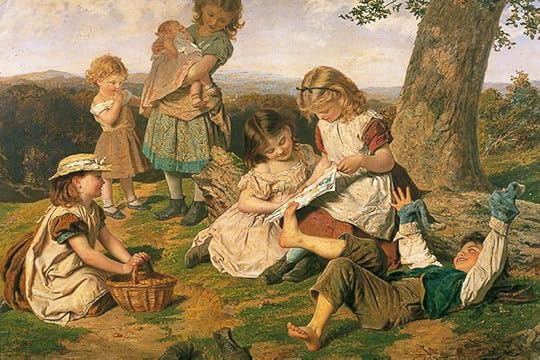 Children’s Story Book by Sophie Gengembre Anderson – Public Domain. Here, of course, we see our children growing up on stories, shaping them in their formative years.
Children’s Story Book by Sophie Gengembre Anderson – Public Domain. Here, of course, we see our children growing up on stories, shaping them in their formative years.Let’s deal with the second item on the list: imposter syndrome. If I write a story or poem with AI, it feels like cheating. I think, “Wow. That was good. But it’s not me.” (Not all the time. Sometimes I think, “Holy wow, AI, what were you thinking?” But it feels fraudulent. I don’t think this is because it’s new technology but a fundamental human value of knowing you take credit for the work you do, not the work of others. I can get behind collaborative work if it is stated as such and not presented as one’s own—who knows? Maybe AI will move us away from individualism and into collective writing, though I’d argue the individual voice still holds value, maybe more so in such a scenario. I’m also not talking about brainstorming or research (e.g., please give me a list of ten popular girls names in 1910 that mean gift) but full-on development and prose writing. Not only does it disconnect me from an ability to resonate with the entire narrative, but it feels as if it’s not my own. That I’m deceiving readers and will be outed. That I’m lip-syncing while someone better sings the track. Some of us already struggle with a profound sense of self-doubt. While AI might help others express themselves, for me, it makes me question my own abilities and even my reasons for writing in the first place. It makes me doubt my feelings, thoughts, perspective, and voice. It makes me think, “Why bother?” when AI can do it good enough, faster, with fewer mistakes. As a people-pleaser, it’s just too tempting to let AI override my own sensibilities and strip my voice. To steer me away from my core reasons for writing in the first place: authentic self-expression.
I write to discover and understand myself, others, and the world around me. I write to express those discoveries, and the act of writing transforms me on some level. I grow through the act. I process my thoughts and pains. I share my loves and joys. I heal, not through reading what is written for me (though that provides benefits) but by writing myself—stretching within myself, breaking past my boundaries to find what’s inside and what needs to be processed into whatever form I release it into, be it fiction, non-fiction, poetry, or art. I change by making those startlingly new perspectives about myself, others, and the world around me. It reshapes my world.
But suppose I am disconnected from the process, due to AI writing for me, or if I manipulate my words to fit into market demand and please others. In that case, I lose any benefit for myself and others who may have resonated with the words I chose to immortalize on the page. I become inauthentic. I become fake. I become the person who says “I love you” when I couldn’t care less.
We need less superficiality, not more.
We need the profound truths of ourselves, not the quick and superficial answers.
Questionable ethics aside*, I am not saying AI has no place in the world. If big tech promises prove true, AI might enhance our world, health, well-being, environment, and planet in mind-blowingly helpful ways. I’m not throwing out its capacity for good, and I’m certainly not qualified to predict the future. Neither am I condemning using assistance in whatever way that feels connected and authentic in your output. I am also not suggesting that people with writing challenges, language barriers, or physical limitations shouldn’t use AI; this may be a boon for them in finally being heard or achieving long-starved dreams. I believe AI can be used, even for writers, in a beneficial way without disconnection.
But, at least for me, not if I let AI do the “expressing” for me. Not if I just agree with its outputs and claim them as my own (I would never do this, btw). Not if I don’t learn the hard work of creative expression myself (digging deep, finding my truths, knowing what works and what doesn’t and why) and how to wield it. Not if I don’t understand the power and potential of words to shape me, others, and our societies.
Perhaps this is a plea for mindfulness as we all navigate these quickly changing creative waters. We ought to decide when and how we use the technology, so we don’t lose that vital ability to express ourselves authentically through writing and other creative endeavors. That we continue to exercise our expressive abilities as a core human activity that keeps us healthy, sane, thinking, questioning, and evolving.
I hear it a lot: AI is a tool. It should not be used to usurp human expression. Ever. I believe human expression and unique voices will become more valuable as soon as all the “using AI to write for profit proliferation” becomes tiresome—which, to me, is right about now.
I get that this is a confusing time. I get that we’re going to experiment and often fail with those experiments and our successes may be few. I also get that others might be feeling as rudderless as I am when the future of our writing passion is so unclear.
But I, for one, am craving authentic voices. Real connections. Real feelings and emotions. Unique perspectives. Narratives that sing with an original perspective that only life experience, depth of feeling, and authentic expression can create. I bet others are, too.
In the meantime, I will keep writing. Keep expressing. Keep being unapologetically slow, thoughtful, intentional, and connected. I’ll keep experimenting. I’ll keep discovering my whats and whys and hows. I’ll keep failing and having successes. It may take time. I may change my mind and direction. But through it all, I’ll keep being human, because losing my creative connection, authenticity, and ability to resonate with the words I put on the page, is not an option.
 Sophie Gengembre Anderson, Scheherazade, Public Domain – the Ultimate Story of a Teller of such epic proportions she not only saved her own life, the lives of countless other hapless would-be wives, but changed the villain’s nefarious beliefs and behaviors through story. Because THAT’s the power of story.
Sophie Gengembre Anderson, Scheherazade, Public Domain – the Ultimate Story of a Teller of such epic proportions she not only saved her own life, the lives of countless other hapless would-be wives, but changed the villain’s nefarious beliefs and behaviors through story. Because THAT’s the power of story. * AI Ethics is a topic unto itself which I will not address here. But it also plays into a creative person’s ability to decide when and how they use AI tools. The scraping and training of datasets on copyrighted material has not been decided by our governing systems yet. As a creative, I am especially interested in the outcomes of these rulings though I also realize that outcomes may not be entirely based on facts and fairness but on a multitude of other factors such as economics and politics. As for my opinion, I believe AI training was unethical simply because, even if courts ruled that the process is transformative, the public was unaware of what was happening to their personal and copyrighted data. It is already affecting marketplaces (including ones I am directly affected by). Advancement should not overrule personal agency in how their data and works are used. We should have a choice. For this reason, using AI brings even more complexity to deciding whether to use it. Unfortunately, I believe the integration of AI on a broader scale is inevitable, regardless of individual choices. So, for me, the question becomes, how do I stay true to myself? In these journal entries, I’m exploring what creativity means to me. What the benefits are to me, to others, and to society. How I proceed in a technologically advancing world. How to keep going or when to give up. How to overcome the many challenges creatives face-technical or otherwise. Of course, I don’t have the answers. I can only share my journey and perhaps, start, continue, or add to the discussion that is affecting us all.
CREDITS:
Music: Capcut
Writing, Filming, Editing, and Animation: Mande Matthews
Editing: C.K. Brooke
“Sunflowers” artwork – Original Pen & Ink with Watercolor and Gouache by Mande Matthews
WRITING PROCESS FOR THIS POST:
Longhand journal entryTranscribed and second drafted via keyboard/WordGrammarly checkHuman editing and feedback (C.K. Brooke)RevisionAsked ChatGPT to flag possible mistruths, lacks in clarity – fact checkedRevision, grammar check in Word, read out loud with WordGrammarly final check inside my WordPress postSeptember 9, 2022
Are You Ready for Something Magical?
Can mice serve tea?
Can birds sing tributes?
Can forests be enchanted and alive?
Is Willamina Wildemore losing her mind or is there something else going on?
Will you join me in finding out?
My latest novelette “For the Love of Wild Things” has been published by Metaphorosis Magazine and is available to read and listen to, yes listen! for free through the links below.
“I welled up so many times; an inspirational short story that’s both deeply emotional, curiously magical, environmentally important.”
“It’s so so so beautiful. If you love enchanted forests, animal rescue, fabulist literature, and meaningful reads, ‘For the Love of Wild Things’ is an absolute, hands down must read.”
Here’s a quick video teaser or just skip to the links and get reading or listening:
Or Go HERE and start your enchanted forest journey.
https://magazine.metaphorosis.com/story/2022/for-the-love-of-wild-things-mande-matthews/
When you’ve finished reading or listening, come on back and let me know what you think.
What’s next?
Soon, I’ll release a work-in-progress excerpt from the next ShadowLight – raw and unedited, so stay tuned.
And colorists, I haven’t forgotten you. Forest dryads portraits and elves are in the works. Make sure you’re signed up below to stay up-to-date with releases.
Once again, I’d love to know what you thought so don’t be shy. I’d also love to hear what you think about food forestry, nature spirits, and wildlife rescue—just a few of my fascinations. Let’s have a conversation. Comment away. Or email me. 
As always, I hope you have a magical day.
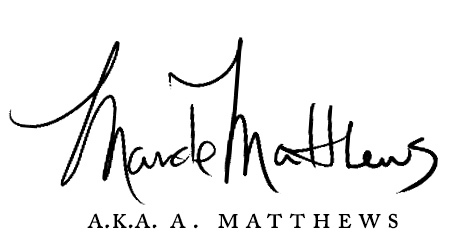
PS
It’s a little early for this announcement; there’s still so much to figure out, but here’s a heads-up.
Something magical is in the works.
A culmination of everything I’ve been working on for over a year. I can’t say what it is just now, but it’s intended to be an ongoing release project, free, enchanted, and for readers and art lovers alike. When I’m closer to the first release, I’ll let you know so make sure you’re on my mailing list for updates. You won’t want to miss this. 
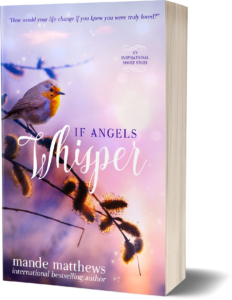 If Angels Whisper, an emotional, heartfelt short story (approx. 10,000 words) with fantasy realism and spiritual elements.
If Angels Whisper, an emotional, heartfelt short story (approx. 10,000 words) with fantasy realism and spiritual elements.
“Warmhearted, motivational, inspirational. This ethereal story will give your heart wings.”
There’s always been something wrong with me but I’m not sure what. I’ve had daydreams of angels since I was a child, specifically a guardian angel to rescue me from my addicted mom, non-existent father, and friendless existence. But now odd events are happening. Like visitations from a robin, visions I can’t explain, and an out-of-body experience—if that’s what it really was. I’m starting to question everything. What secrets have my parents been keeping? Who am I, really? And could I be worthy of love in more ways than I ever imagined?
Download and Read for FREE:
Amazon | Other Retailers
Also available on Google Play and internationally
Available for instant download on Etsy/Shop/AffairOfTheArts
October 5, 2021
2 Cuties & 3 Beauties Coloring Pages – Mermaids, Goddesses, and Nymphs, Oh, My!
I’m pretty much obsessed with roses and mermaids. Completed artwork turned coloring pages include both!
First off, Goddesses and Nymphs. Inspired by the Greeks because the Greeks loved both roses and flowers. Chloris (nymph of spring, flowers, and new growth), Aphrodite (goddess of love AND roses!), and Antheia (nymph with a penchant for flower wreaths – who knew?)
Goddess Coloring Pages
And secondly, two new cutie mermaid coloring pages have been released. These are near and dear to my heart as each has a special friend. I imagine the baby seal as a Hawaiian monk seal, which is one of the most critically endangered seals on our big beautiful planet. The little porpoise on the right, well, she’s a vaquita baby, which is not only the smallest porpoise (adults weighing in at 100ish pounds, babies at only 17!), they are also one of the most endangered species on the planet with only NINE left. Color AND spread awareness. It’s a win-win for us and our animal friends we share this earth with.
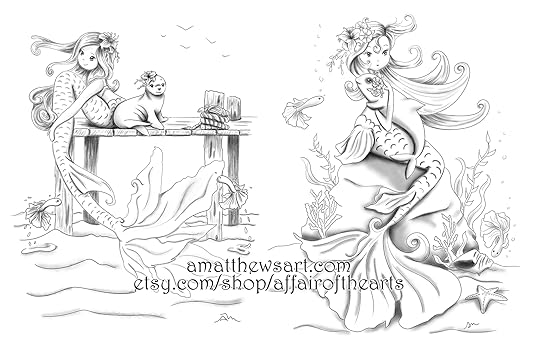 Cute Mermaid Coloring Pages with their darling friends – a baby seal and a baby vaquita!
Cute Mermaid Coloring Pages with their darling friends – a baby seal and a baby vaquita!
October 1, 2021
Trick or Treat? Treat, of course! A Free Witch’s Familiar Coloring Page for Instant Download
To kick off October, here’s a free, instant downloadable Witch’s Familiar Magical Kitten Coloring Page. Just click the link below the picture to download it in either JPG or PDF.
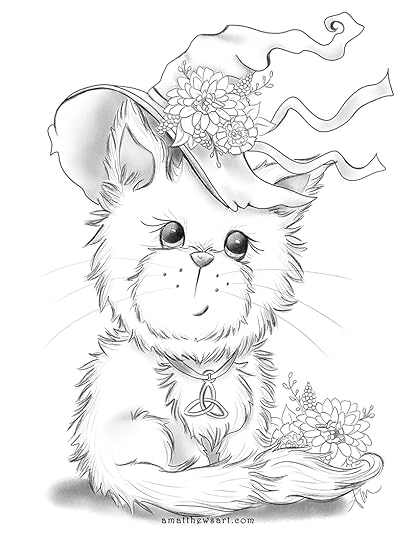 Free Halloween Coloring Page, Wicca, Magical Witch’s Familiar Kitten Coloring Page Instant Download PDF & JPG
Free Halloween Coloring Page, Wicca, Magical Witch’s Familiar Kitten Coloring Page Instant Download PDF & JPGDOWNLOAD HERE (choose your file type):
PDF Please! | JPG Please!
Wait! Don’t miss out on more freebies. Sign up and become my insider and get instant access to these free coloring pages!
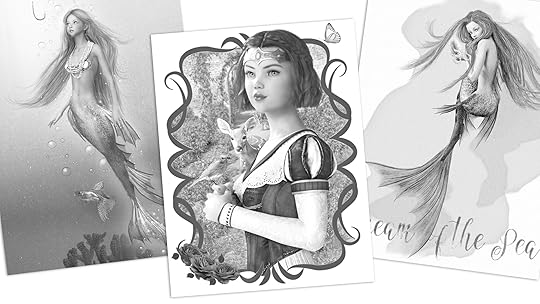
Cute Mermaids and Friends are listing on Etsy soon. Great for mermaid-themed party favors or just plain full family coloring fun. Check them out here.

Have a magical day!

